Frank, Brooks, Eddie and Cal: Who's the greatest Baltimore Oriole of all time?
Some of the greatest players in Major League Baseball have worn the uniform of the Baltimore Orioles over the years. But which players have had the best careers while calling Oriole Park at Camden Yards or Memorial Stadium their home field?
We've compiled a list of the top 50 Baltimore Orioles players of all time. It features plenty of names you would expect to see on the list, and maybe some that will surprise you. That's what makes it fun.
Our list is based on Wins Above Replacement - better known as WAR - ratings from baseball-reference.com. WAR is meant to measure how much better a player is than a player that would typically be available to replace that player. The higher the number, the better that player is than the average replacement-level player.
It's not the perfect system for ranking players, but it's a good indicator for creating a list and putting it up to fans for debate.
The WAR ratings listed are accumulated only from a player's time with the Baltimore Orioles. Therefore, while Frank Robinson is widely regarded as one of baseball's all-time greats, he ranks lower on this list than one might expect because he played only six seasons in Baltimore.
The list does not include players who played for the St. Louis Browns before the franchise moved to Baltimore in 1954. It also does not include managers — although two former managers do appear in the rankings as players. So, aside from this, you'll see no mention of Earl Weaver — one of the quintessential Orioles of them all.
As the 2024 season begins, only one current Oriole is on the list, but some are working toward the top 50. They include John Means (9.8 WAR), Adley Rutschman (9.6), Austin Hays (9.0), Anthony Santander (7.9), Ramon Urias (7.4) and Gunnar Henderson (7.1).
Falling off the list in 2024: Chris Davis (12.0 WAR)
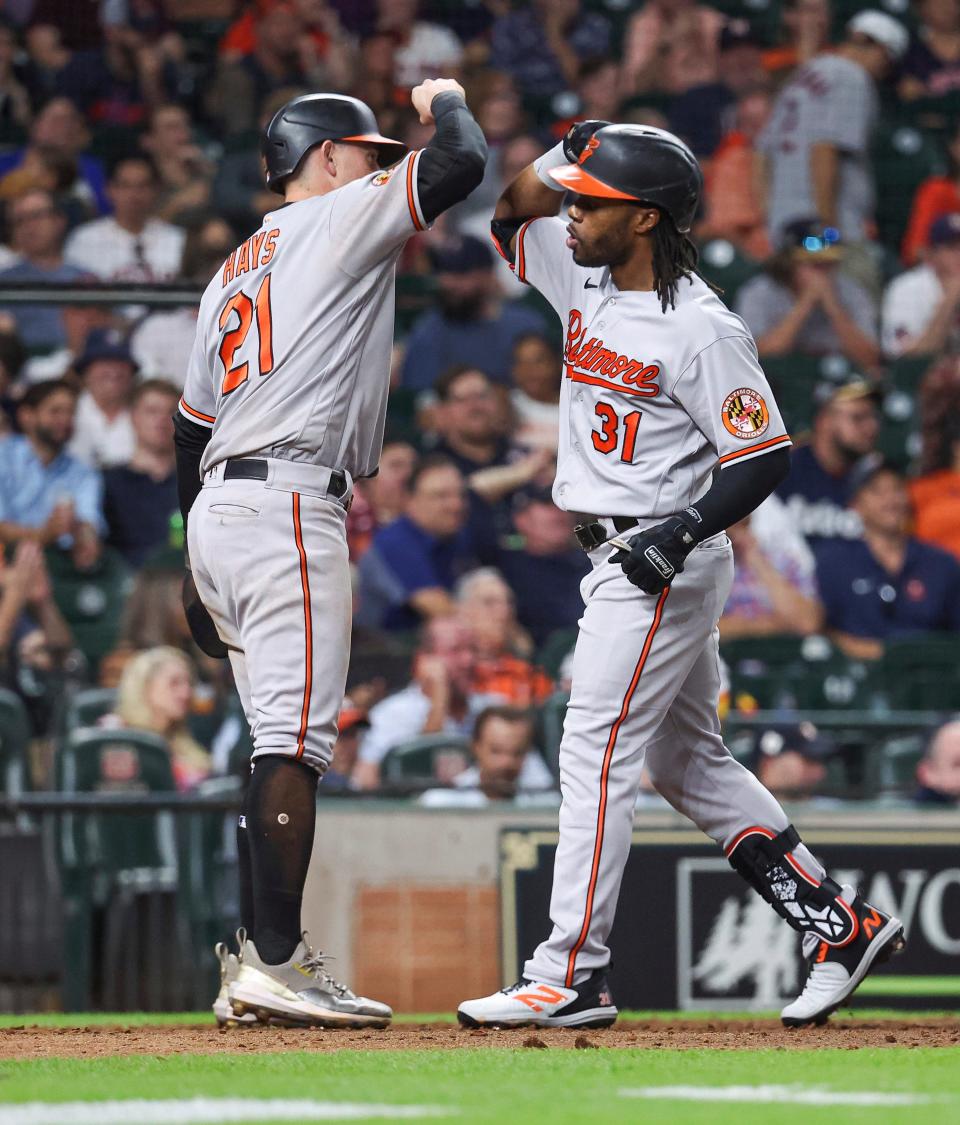
50. Cedric Mullins - 12.2 WAR
The only current Oriole on the list, Cedric Mullins played parts of three seasons in Baltimore before cementing his place as the team's everyday center fielder in 2021. Mullins broke out in a big way, batting .291 with 37 doubles, 30 homers and 30 stolen bases. He was elected to the All-Star Game, won the American League's Silver Slugger Award for center fielders and finished ninth in Most Valuable Player balloting. Entering his seventh MLB season, Mullins has a .257 career batting average with 105 doubles, 68 HRs, 224 RBIs and 93 SBs.
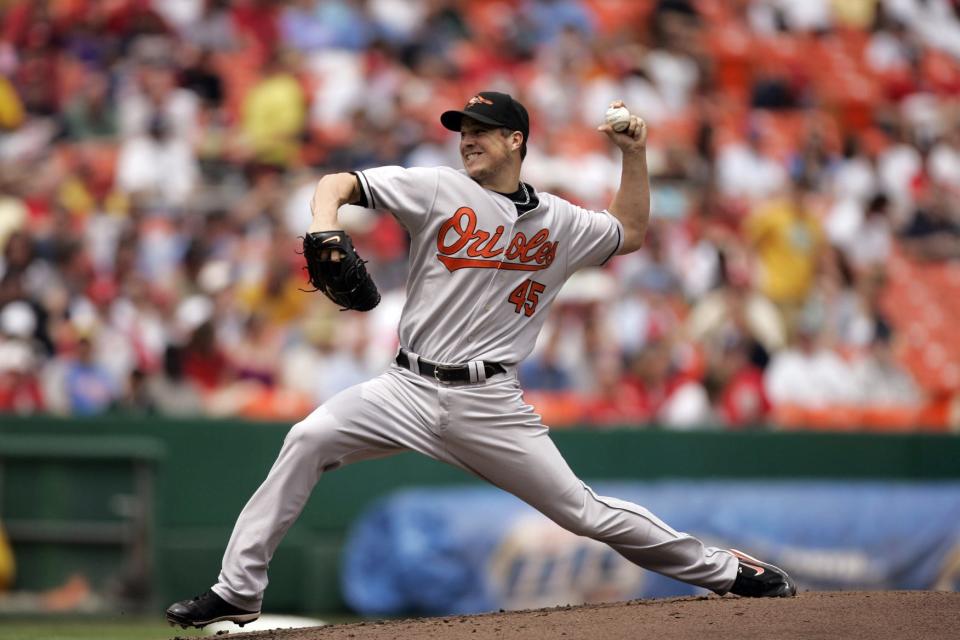
49. Erik Bedard - 12.8
Erik Bedard was a standout on some not-so-good Baltimore teams in the mid-2000s. He went 40-34 over five seasons with a 3.83 ERA. He was 13-5 with a 3.16 ERA and 221 strikeouts and finished fifth in Cy Young voting in 2007. That offseason, he was traded to Seattle in the deal that brought Adam Jones to the Orioles.
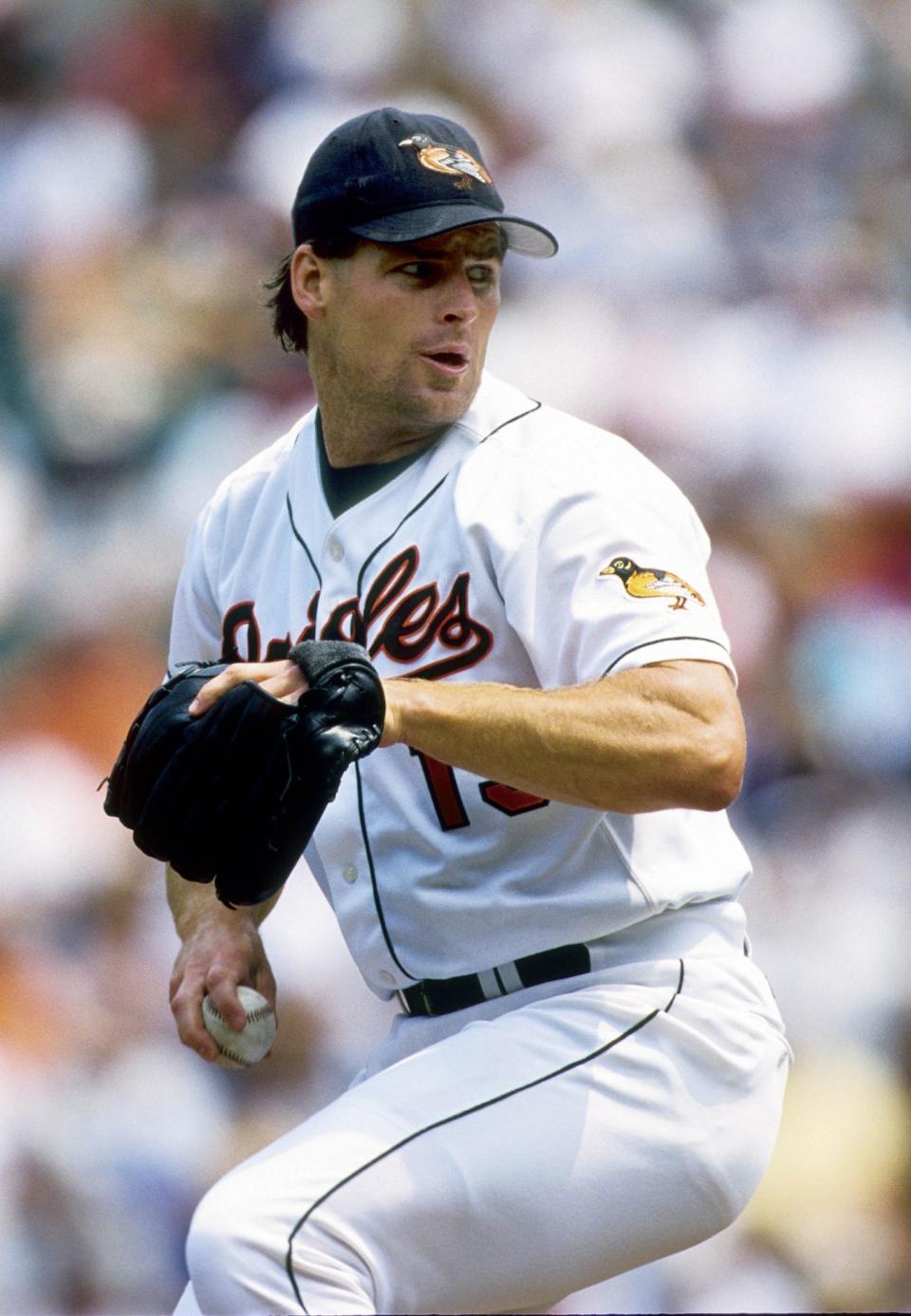
48. Scott Erickson - 13.1
Scott Erickson was traded from Minnesota to Baltimore in July 1995 and made an immediate impact, going 9-4 in 17 starts that season. He backed it up with four consecutive winning seasons, including a 16-7 mark in 1997 and going 2-0 that postseason. Erickson went 79-68 in seven seasons for the O's.
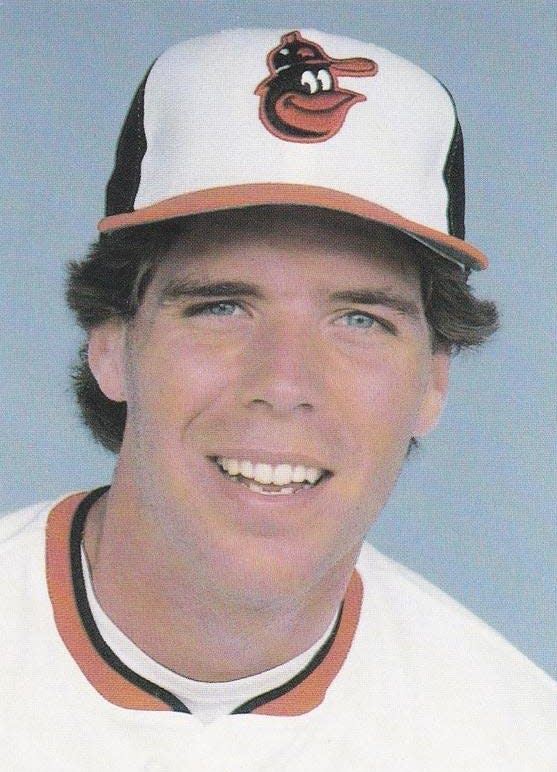
47. Storm Davis - 13.4
Storm Davis made a splash at age 20, going 8-4 with a 3.49 ERA and 67 strikeouts in 100.2 innings in 1982. He improved on that the next two seasons, going 13-7 in 1983 and 14-9 in 1984. Davis was 61-43 over six seasons with the O's before being traded to San Diego following the 1986 season.
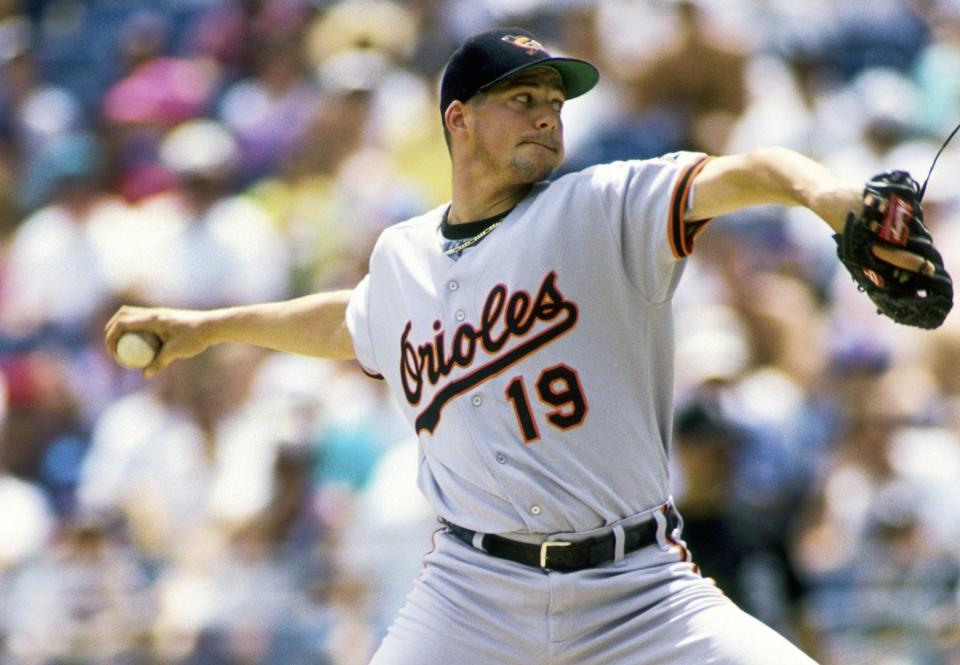
46. Ben McDonald - 13.7
Injuries prevented Ben McDonald from ever fully living up to the hype of being selected with the first overall pick by the Orioles in the 1989 MLB Draft. Across seven seasons in Baltimore, McDonald went 78-70 with a 3.91 ERA, but only twice logged more than 25 starts in a season. His best year came in the strike-shortened 1994 season, when he went 14-7.
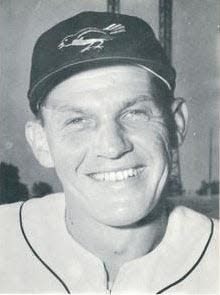
45. Bob Nieman - 14.4
Outfielder Bob Nieman was hitting .300 when he was traded from the Chicago White Sox to the Orioles in May 1956. He finished that season at .320 with 14 HRs and 68 RBIs and finished seventh in AL MVP voting. Nieman batted .301 over six seasons in Baltimore, with 82 HRs and 336 RBIs.
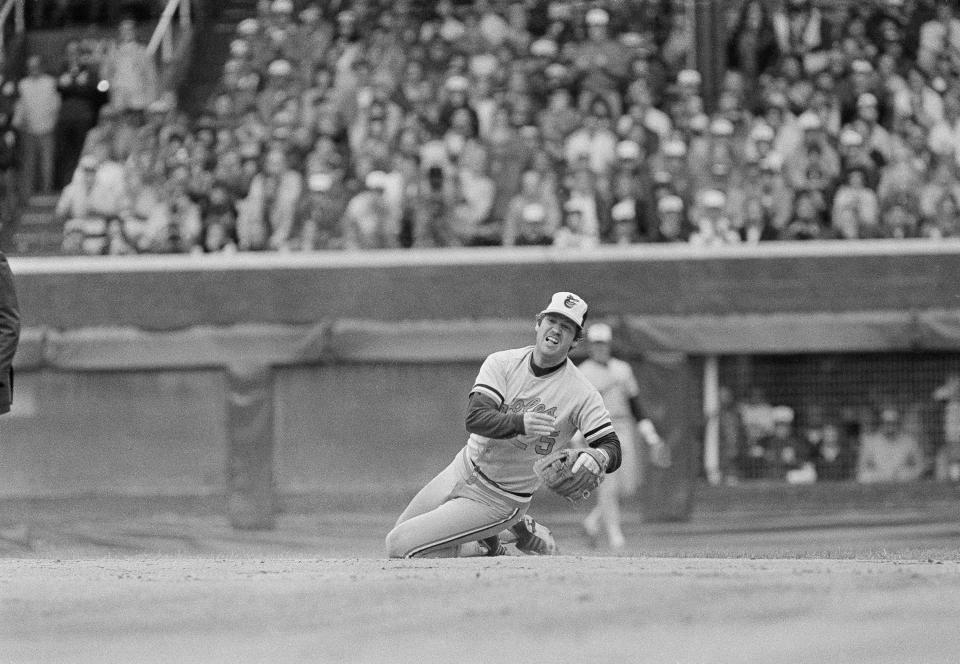
44. Rich Dauer - 14.4
Rich Dauer spent his entire 10-year career (1976-1985) in Baltimore and was a solid No. 2 or No. 8 hitter and a better defensive player, mostly at second base. He had a .257 career batting average, with his most productive year coming in 1980 when he batted .284 and drove in 63 runs. In 1978, he set single-season American League records with 86 consecutive errorless games and 425 straight errorless chances.
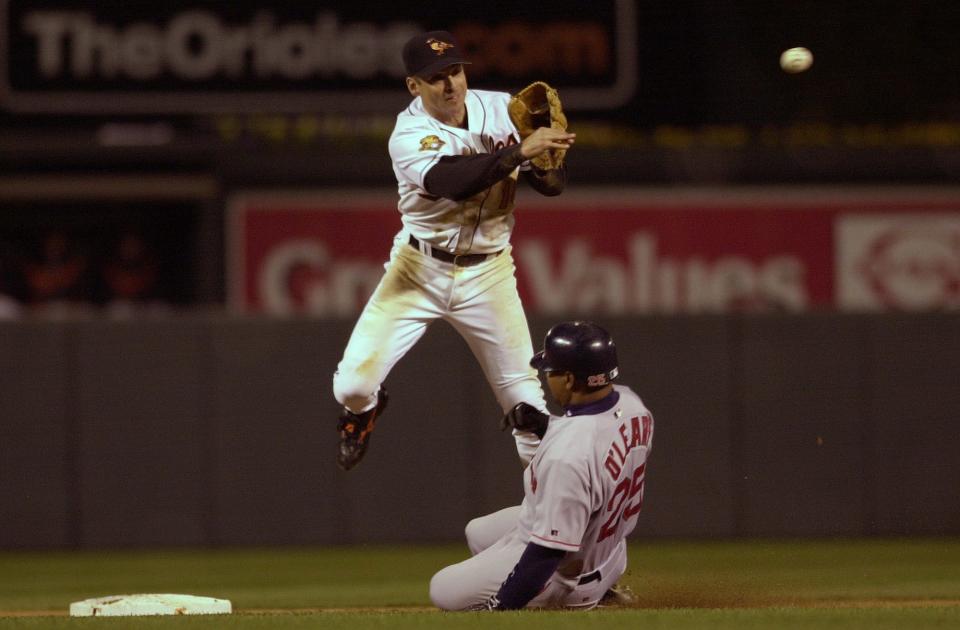
43. Mike Bordick - 14.5
Shortstop Mike Bordick's arrival from Oakland in 1997 necessitated (or allowed for) Cal Ripken Jr.'s move to third base. Bordick spent most of the next six seasons in Baltimore - save for a trade deadline move to the New York Mets in 2000 before re-signing with the O's in 2001. He batted .260 with 299 RBIs and was an above-average defensive player during the golden age of shortstops in the late 1990s.
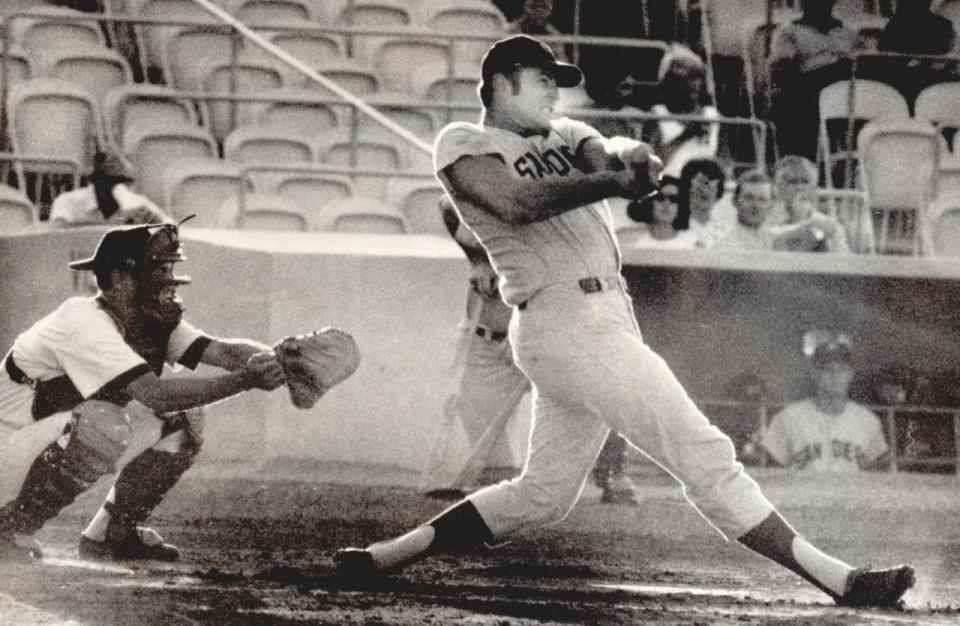
42. Jim Gentile - 14.8
Jim Gentile played just four seasons in Baltimore, but he put up big numbers during his short stay. The first baseman hit .272 with 124 HRs and 398 RBIs from 1960 to 1963. He was an all-star his first three seasons, was second in Rookie of the Year voting in 1960 and third in MVP voting in 1961, when he hit .302 with 46 HRs and 141 RBIs.
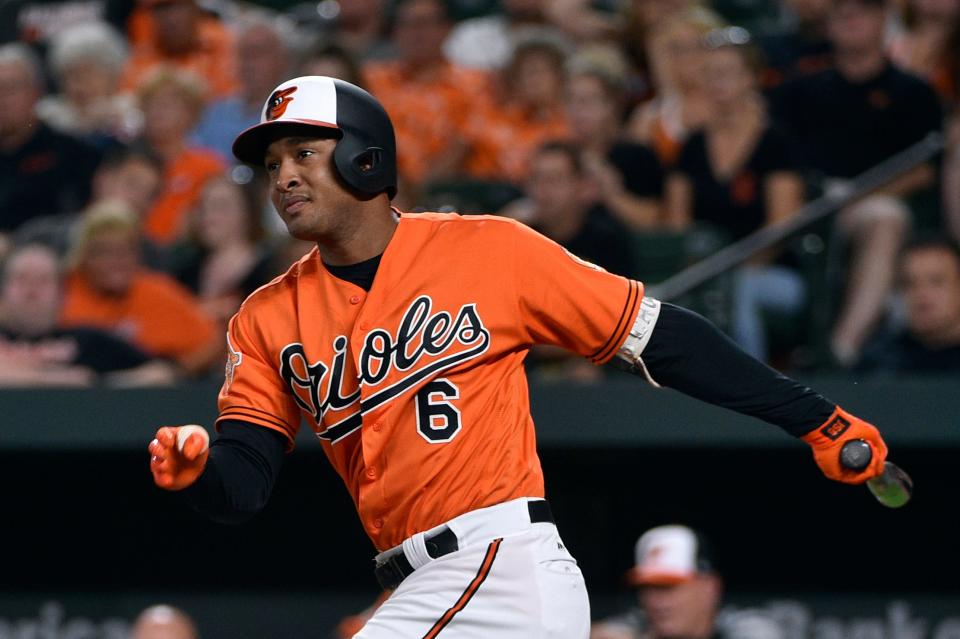
41. Jonathan Schoop - 15.2
Jonathon Schoop won the second base job as a 22-year-old in 2014 and finished that season with 16 HRs and 45 RBIs. He put it all together two years later, batting .267 with 25 HRs and 82 RBIs, followed by a .293/32/105 season in 2017 before being dealt at the trade deadline in 2018.
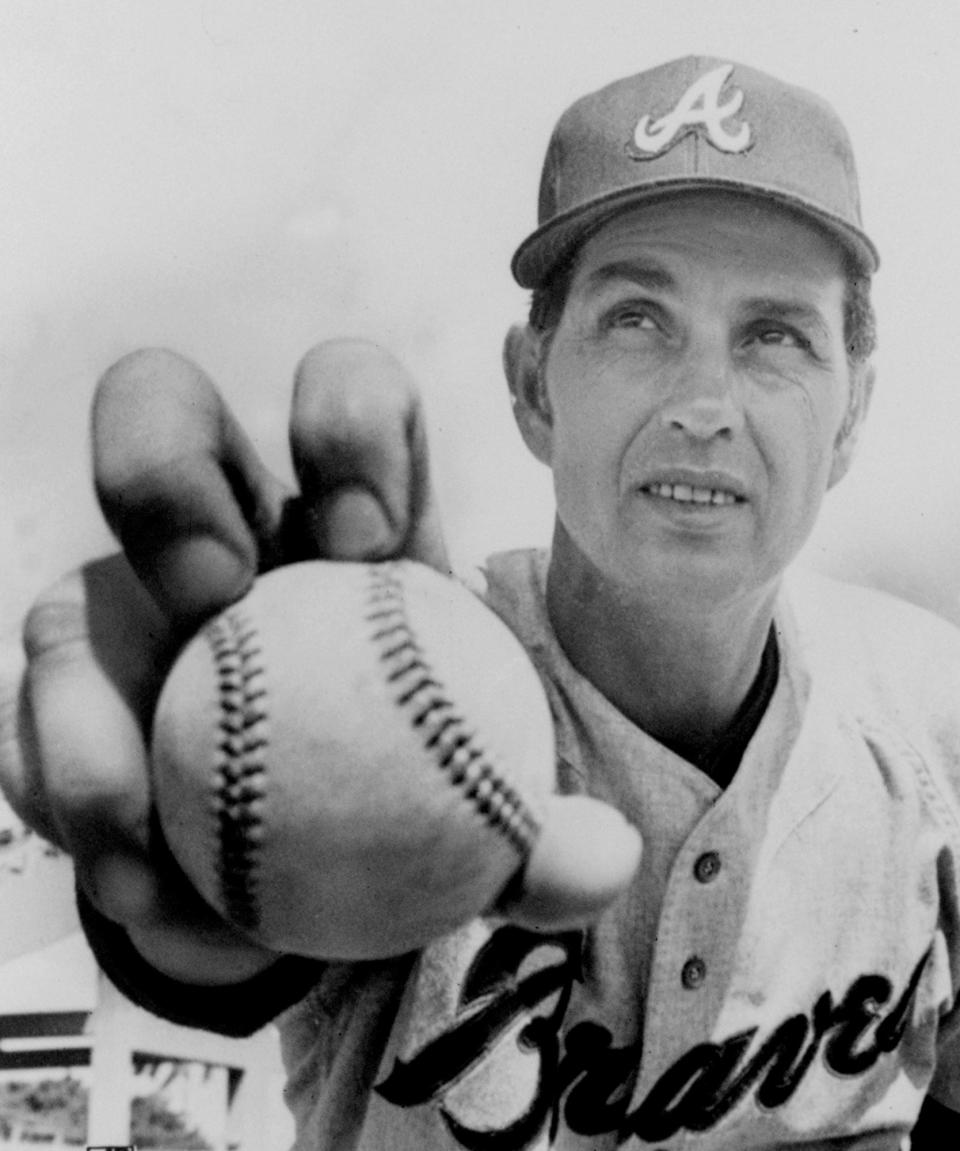
40. Hoyt Wilhelm - 15.6
Hoyt Wilhelm started just six games in his first seven seasons in the majors before being traded to the Orioles in 1958. But he started 27 times in his first full season with the O's in 1959 and posted an MLB-best 2.19 ERA. In four-plus seasons in Baltimore, Wilhelm went 43-39 with a 2.42 ERA and was an all-star three times.
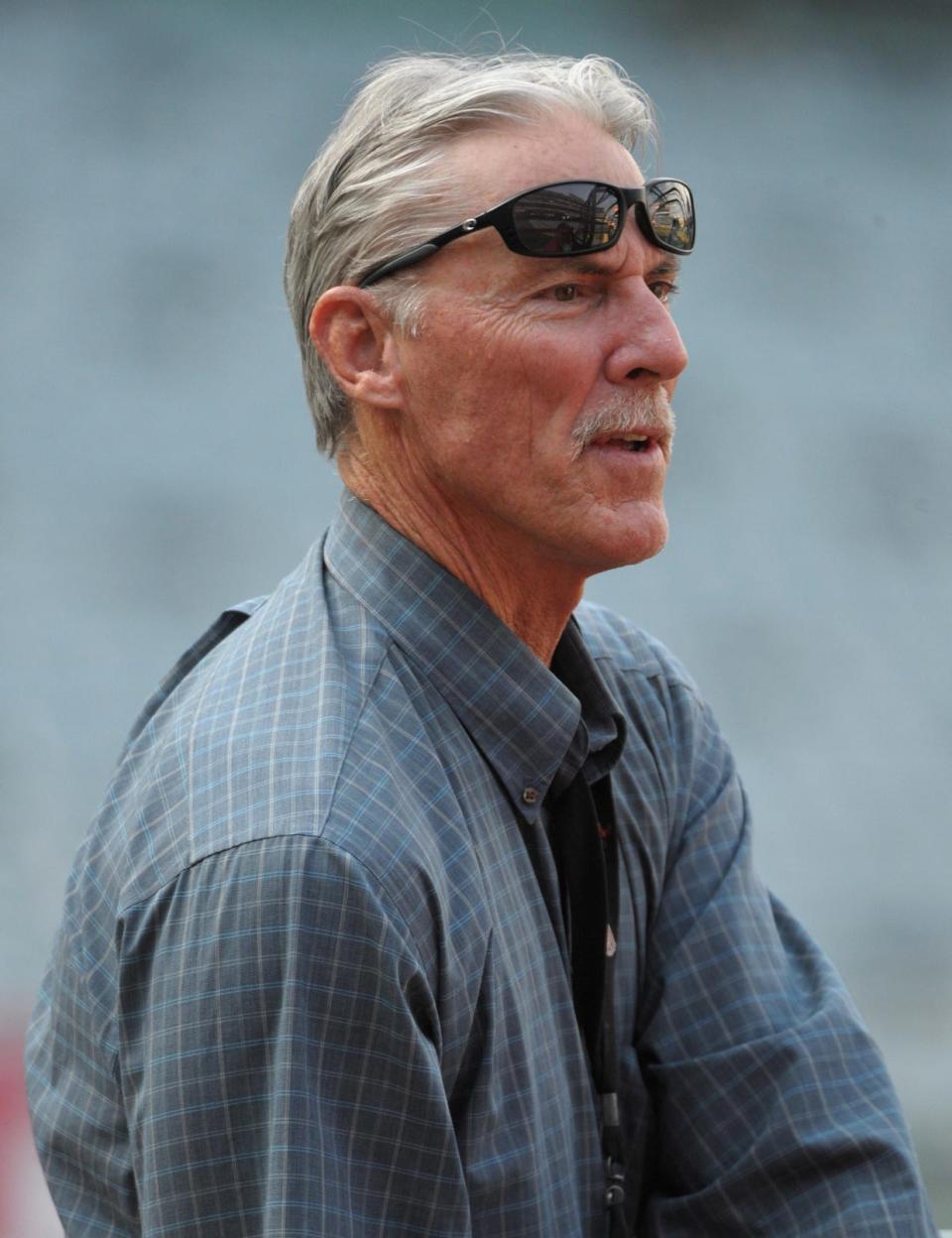
39. Gary Roenicke - 15.7
As the right-handed hitting half of a righty-lefty outfield platoon with John Lowenstein, Gary Roenicke spent eight seasons with the Orioles, batting .250 with 106 HRs and 352 RBIs. His best season was in 1982, when he hit .270 with 21 HRs and 71 RBIs.
38. J.J. Hardy - 15.7
J.J. Hardy came to the Orioles from Minnesota before the 2011 season and responded with arguably the best season of his career, batting .269 with 30 HRs and 80 RBIs. In seven seasons in Baltimore, Hardy batted .252 with 107 HRs and 385 RBIs. He was also a great fielder and won three straight Gold Gloves at shortstop from 2012 to 2014.
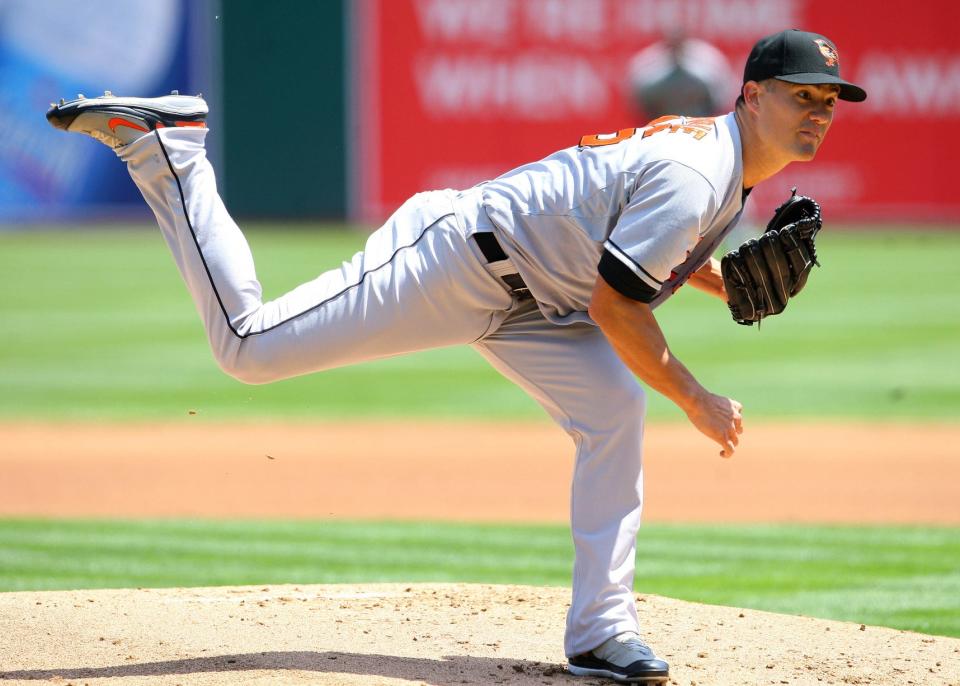
37. Jeremy Guthrie - 16.1
Like Erik Bedard, Jeremy Guthrie pitched for some bad teams during his tenure in Baltimore as the O's never won more than 69 games between 2007 and 2011. Guthrie was the team's winningest pitcher in 2008, 2009 and 2010, but only had a winning record in his first season, going 8-4 in 2007. He finished 47-65 with a 4.12 ERA in his five years in Baltimore.
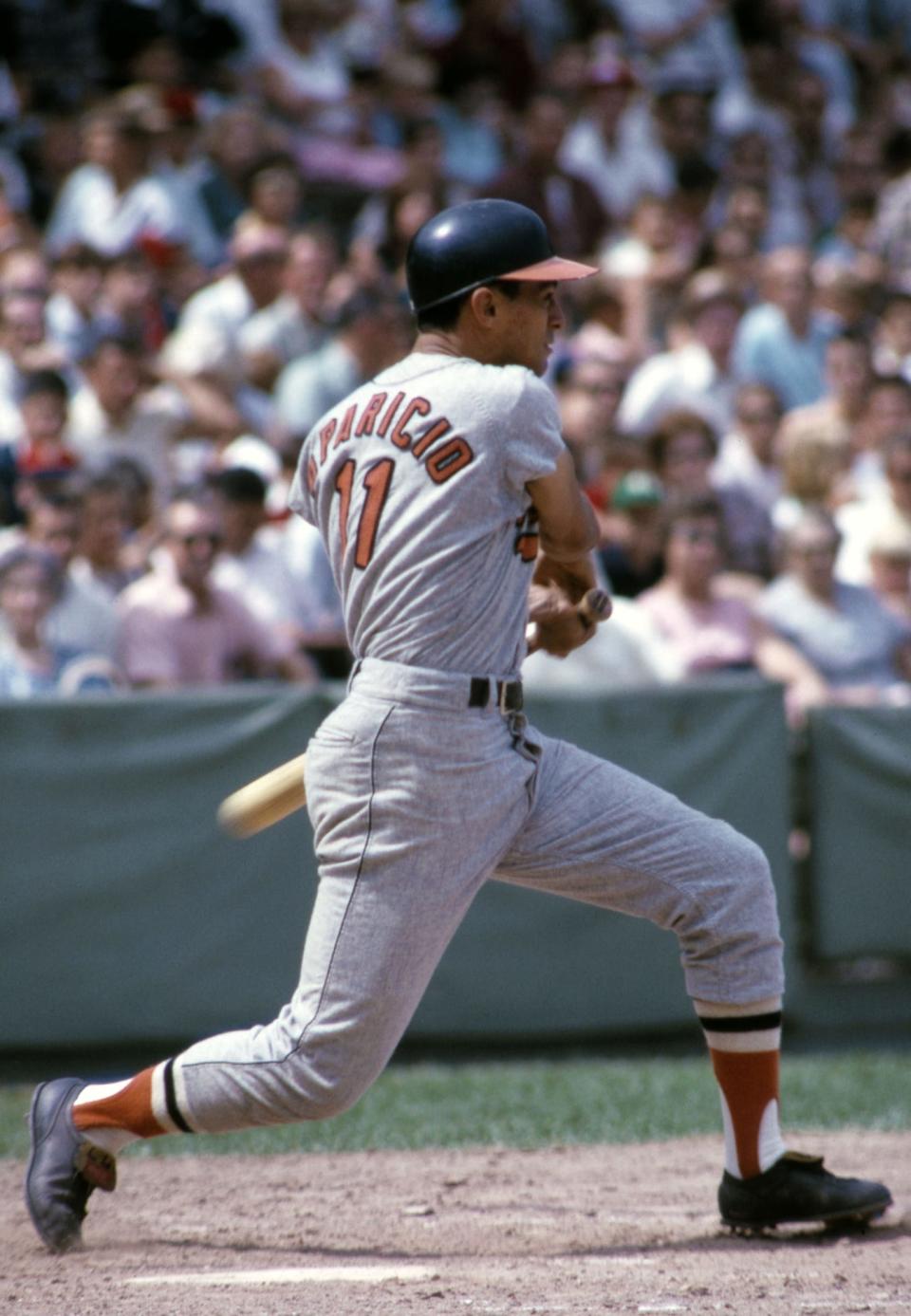
36. Luis Aparicio - 16.4
Shortstop Luis Aparicio came to the Orioles in 1963 in the trade that sent Hoyt Wilhelm to the Chicago White Sox. In five seasons in Baltimore, was twice an all-star, twice a Gold Glover and twice led the majors in stolen bases. He batted .251, scored 385 runs, drove in 194 and stole 166 bases.
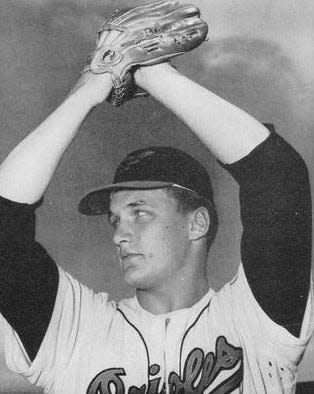
35. Steve Barber - 16.9
Steve Barber pitched for 7 1/2 seasons in Baltimore from 1960 to 1967 and had a winning record in six of his first seven years. His highest ERA in those winning seasons was just 3.46, and he finished his time in Baltimore with a 95-75 record and a 3.12 ERA. His best season was 1963, when he finished 20-13 with a 2.75 ERA.
34. Merv Rettenmund - 17.0
Outfielder Merv Rettenmund only surpassed 100 games played in three of his six seasons in Baltimore and two of those seasons accounted for Rettenmund's best years. He batted .322 with 18 HRs and 58 RBIs in 1970 and hit .318 with 11 HRs and 75 RBIs in 1971. A .271 career hitter, he hit .284 as an Oriole.
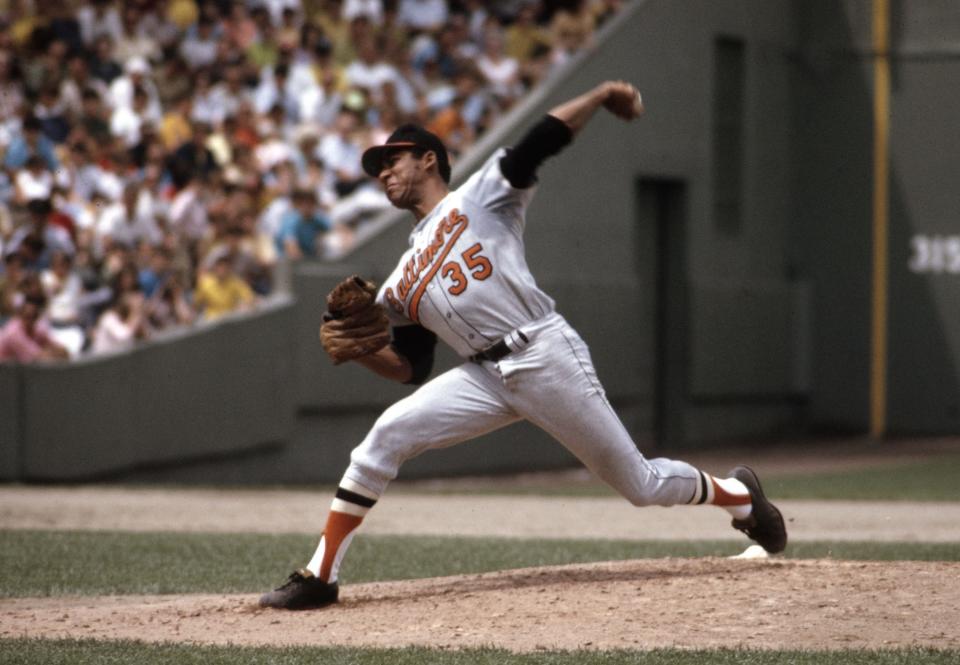
33. Mike Cuellar - 17.1
Mike Cuellar showed signs of a promising career during four seasons in Houston. But he was dominant from the get-go when he arrived in Baltimore in 1969. He went 23-11 that year, winning the AL Cy Young Award and finishing eighth in AL MVP voting. He followed with a 24-8 record in 1970 and a 20-9 mark in 1971. He added another 20-win season (22-10) in 1974 and finished his O's career with a 143-88 record and 3.18 ERA.
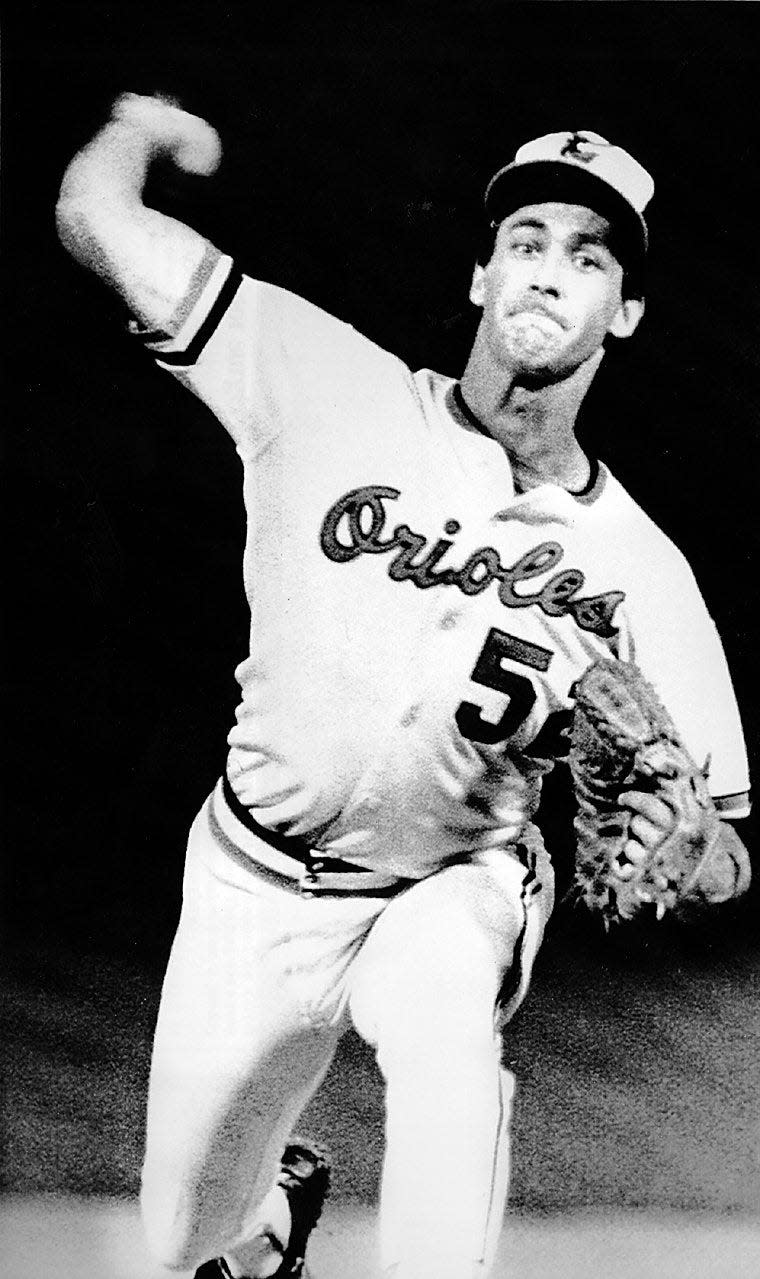
32. Mike Boddicker - 17.4
Mike Boddicker made his first appearance with the Orioles in 1980, but he didn't stick in the majors until 1983 - and he made sure he stuck that season. Boddicker went 16-8 with a 2.77 ERA and five shutouts in the regular season and finished third in Rookie of the Year voting. That postseason, he was named ALCS MVP after throwing a five-hit shutout with 14 strikeouts in Game 2 against the Chicago White Sox. He then threw a complete-game three-hitter in Game 2 of the World Series against Philadelphia. Boddicker went 20-11 and led the AL with a 2.79 ERA in 1984 and he finished his time in Baltimore with a 79-73 record.
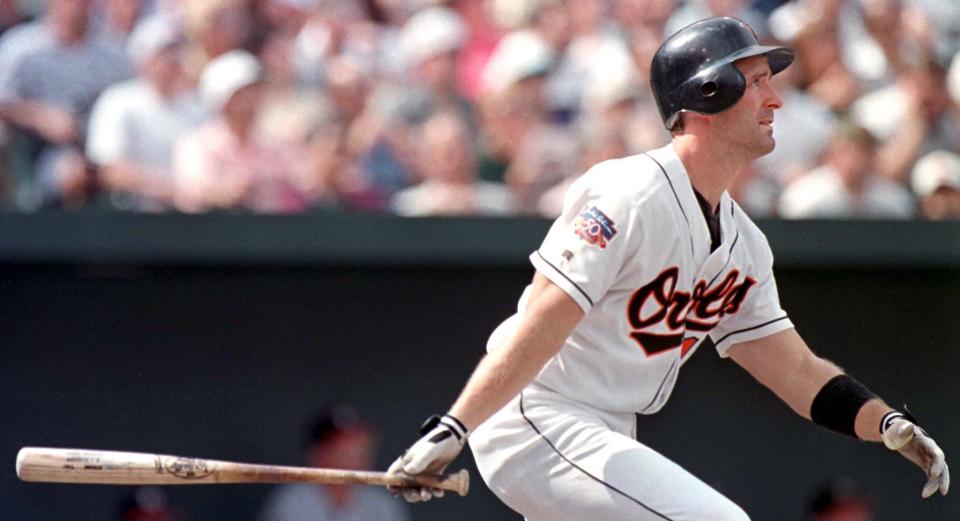
31. B.J. Surhoff - 17.7
B.J. Surhoff came to the Orioles as a free agent before the 1996 season, just as the team was primed to become a contender once again. Surhoff, who was drafted first overall as a catcher by Milwaukee in 1985, played third base most of the 1996 season in Baltimore before transitioning full-time (mostly) to the outfield in 1997. Beloved in Baltimore for his hard-nosed style of play, Surhoff batted .291 with 120 HRs and 551 RBIs during two stints with the O's (1996-2000, 2003-2005).
30. Matt Wieters - 18.2
A huge amount of buzz surrounded Matt Wieters after the Orioles selected him fifth overall in the 2007 MLB Draft. He made his debut in 2009 and made good on the hype, batting .288 with 9 HRs and 43 RBIs in 96 games. His two best seasons were in 2011 (.262/22/68) and 2012 (.249/23/83) when he was both an all-star and a Gold Glove winner. He batted .256 with 117 HRs and 437 RBIs in eight seasons as an Oriole.
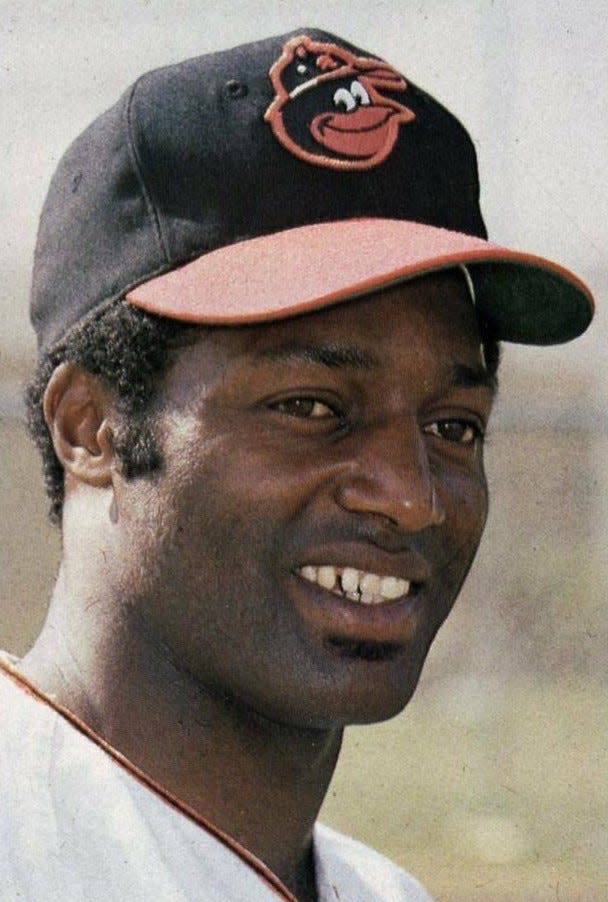
29. Don Buford - 19.2
Don Buford came to Baltimore in the trade that sent Luis Aparicio to the Chicago White Sox after the 1967 season. He batted .270 with 67 HRs and 252 RBIs in five seasons with the Orioles, with a high mark of .291 in 1969.
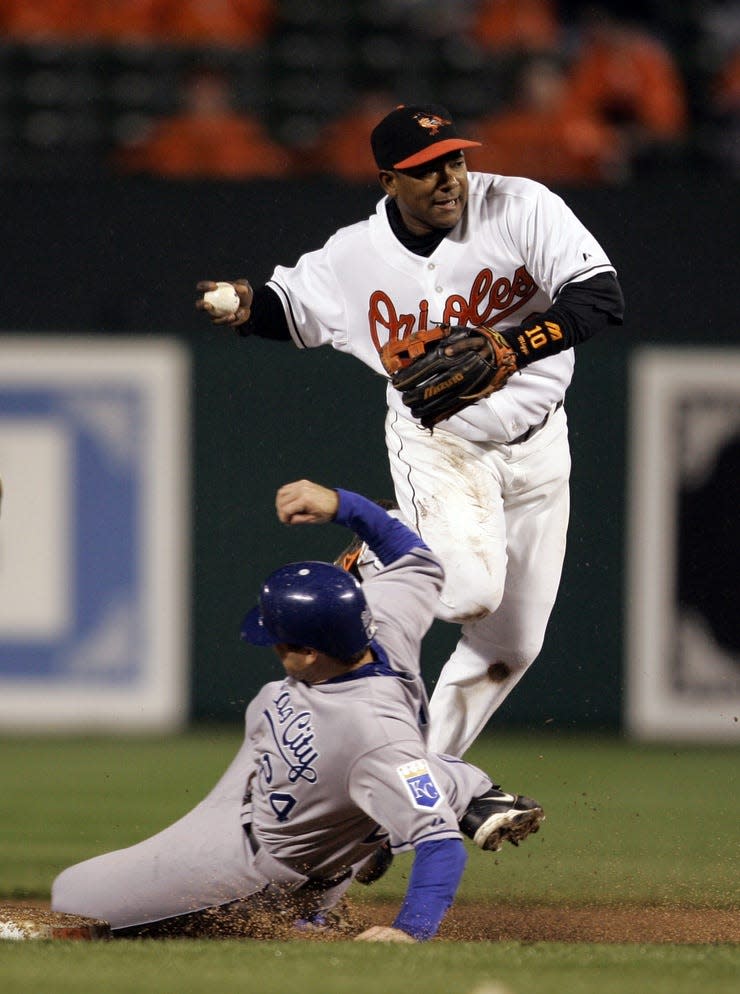
28. Miguel Tejada - 19.5
Shortstop Miguel Tejada was the Orioles' big free-agent acquisition before the 2004 season, and though his presence didn't make the team a contender, it wasn't because of a lack of production on his part. In his first four seasons with the O's, Tejada batted .311 with 146 doubles, 102 HRs and 429 RBIs. He finished fifth in AL MVP balloting in 2004 and was an all-star each of his first three seasons. He signed as a free agent again in 2010, but wasn't the same player and was dealt to San Diego at the trade deadline.
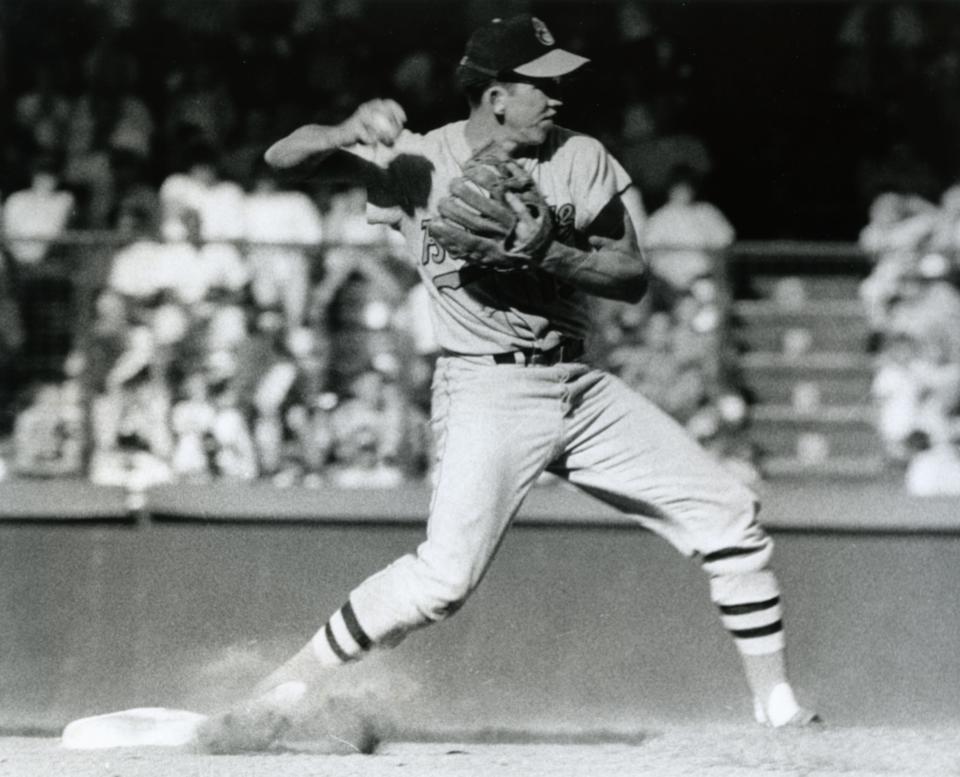
27. Davey Johnson - 20.0
Davey Johnson was a solid hitter in the back half of the Orioles lineup throughout his eight seasons but was perhaps better known for his defense. Johnson was a three-time Gold Glove winner at second base, a three-time all-star and was third in Rookie of the Year voting in 1966. He batted .259 with 66 HRs and 391 RBIs in Baltimore. Johnson also managed the Orioles in 1996 and 1997, leading the team to the American League Championship Series both years.
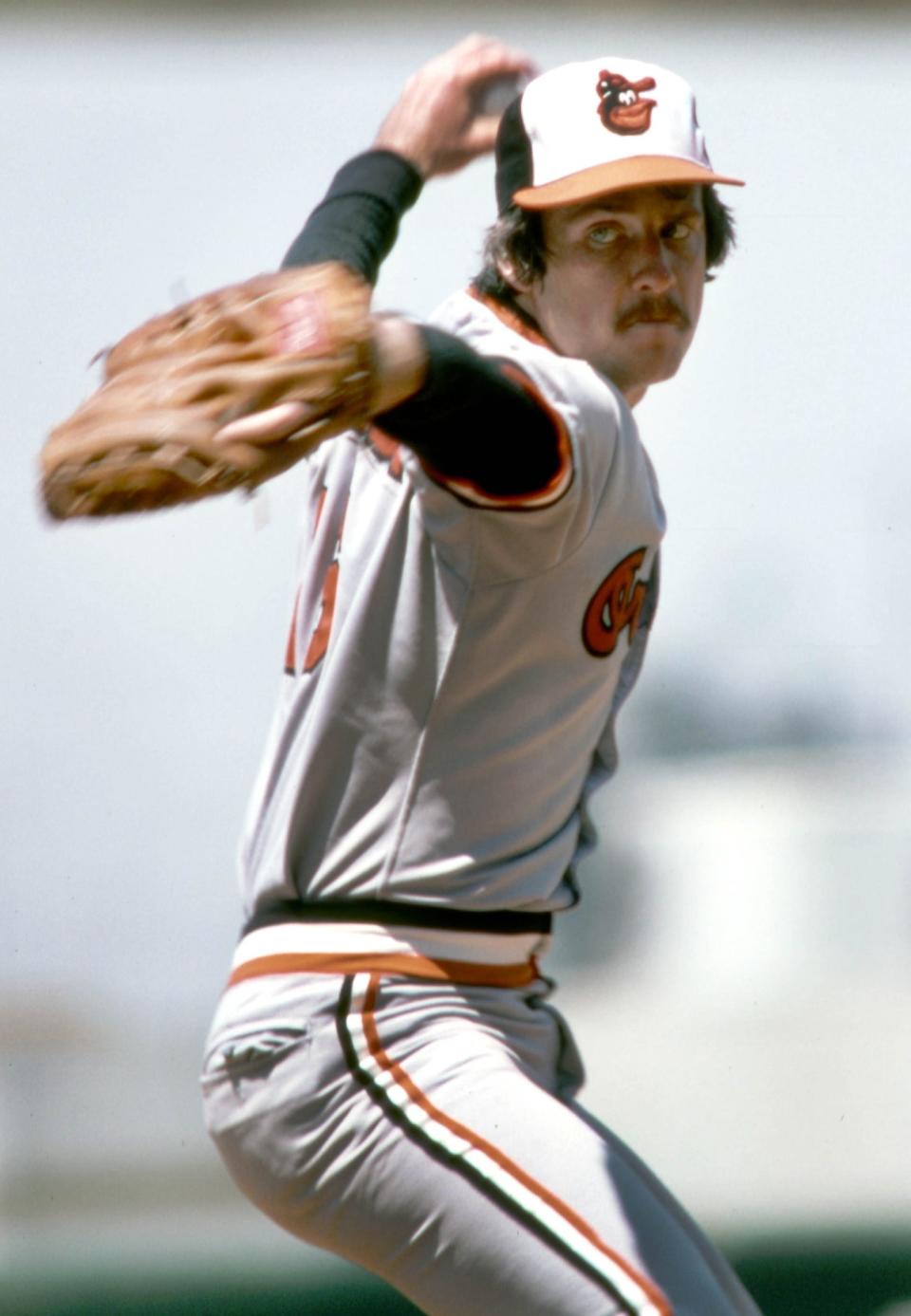
26. Scott McGregor - 20.2
Scott McGregor's entire 13-year career (1976-1988) was played in Baltimore. The left-hander was a starter for nine of those seasons and he posted double-digits in wins each of those nine years. He finished sixth in AL Cy Young Award voting twice – in 1980 when he was 20-8 with a 3.32 ERA, and in 1983 when he was 18-7 with a 3.18 ERA. In six postseason starts, he was 3-3 with a 1.63 ERA. McGregor finished his career with a 138-108 record and a 3.99 ERA.
25. Rick Dempsey - 21.2
Undoubtedly one of the most beloved Orioles of all time, Rick Dempsey played 12 seasons (1976-1986, 1992) with the Orioles and was one of the best defensive catchers of his time. In the regular season with the Orioles, Dempsey batted .238 with 75 HRs and 355 RBIs. But he really shined in the postseason, hitting .324 in two World Series appearances with Baltimore and being named MVP of the 1983 World Series.
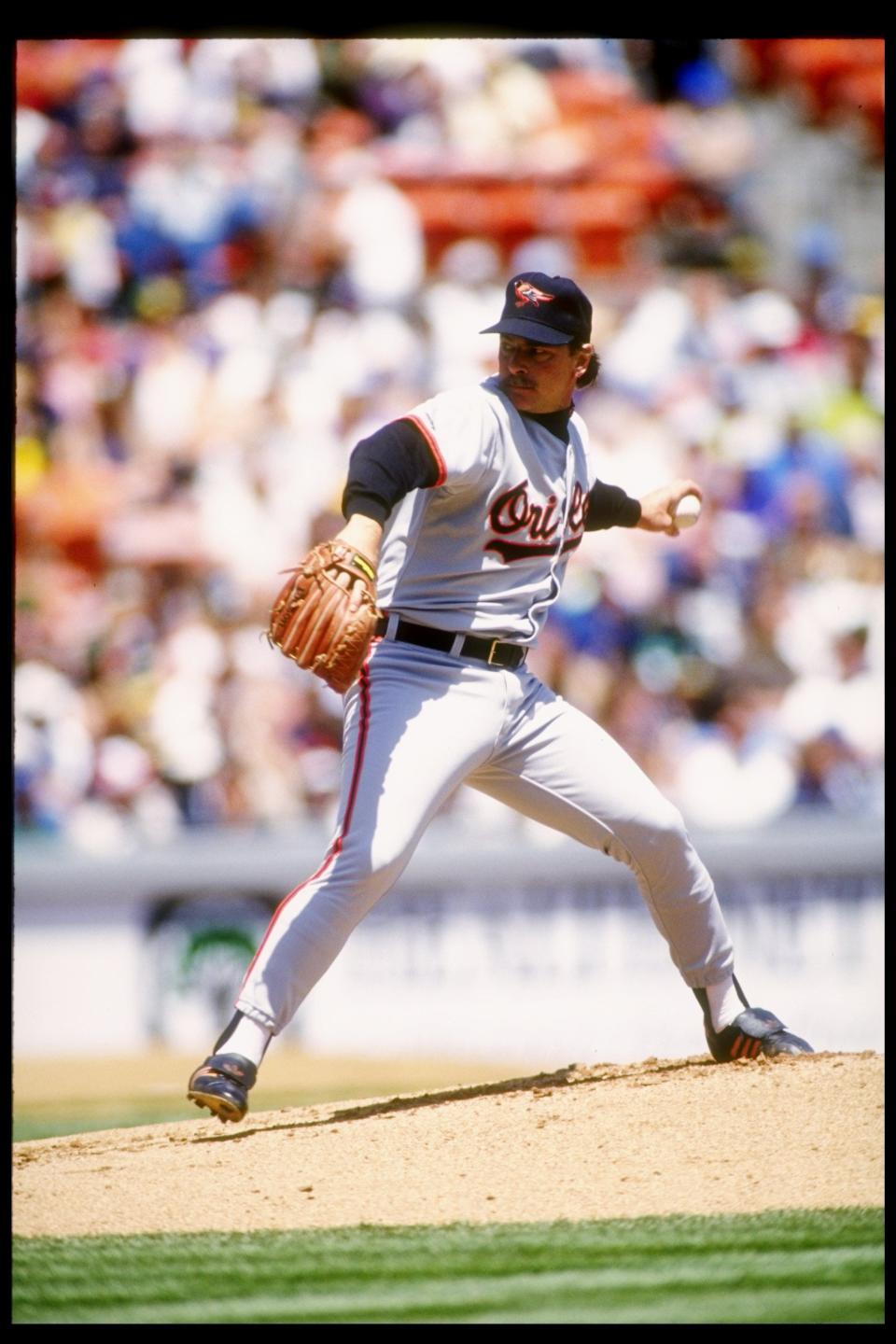
24. Mike Flanagan - 21.4
Mike Flanagan became a full-time starter with the Orioles in 1978 and was an all-star that season, going 19-15. The next year, Flanagan went 23-9 with a 3.03 ERA, won the AL Cy Young Award and finished sixth in AL MVP voting. Across two stints (1975-1987, 1991-1992) with the Orioles, Flanagan went 141-116 with a 3.90 ERA.
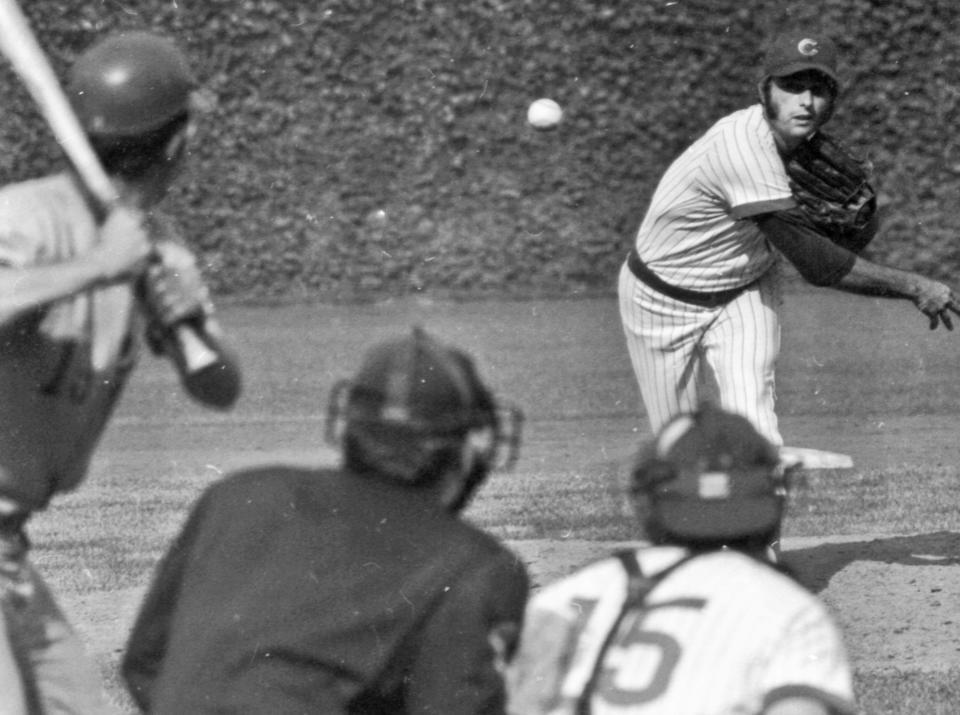
23. Milt Pappas - 21.7
Milt Pappas made his first appearance with the Orioles as an 18-year-old in 1957. In eight full seasons in Baltimore, Pappas never won fewer than 10 games and twice won 16 in a year. He finished with a 110-74 record and 3.24 ERA, but he's perhaps best remembered as one of three players sent to Cincinnati in a trade for Frank Robinson in 1965.
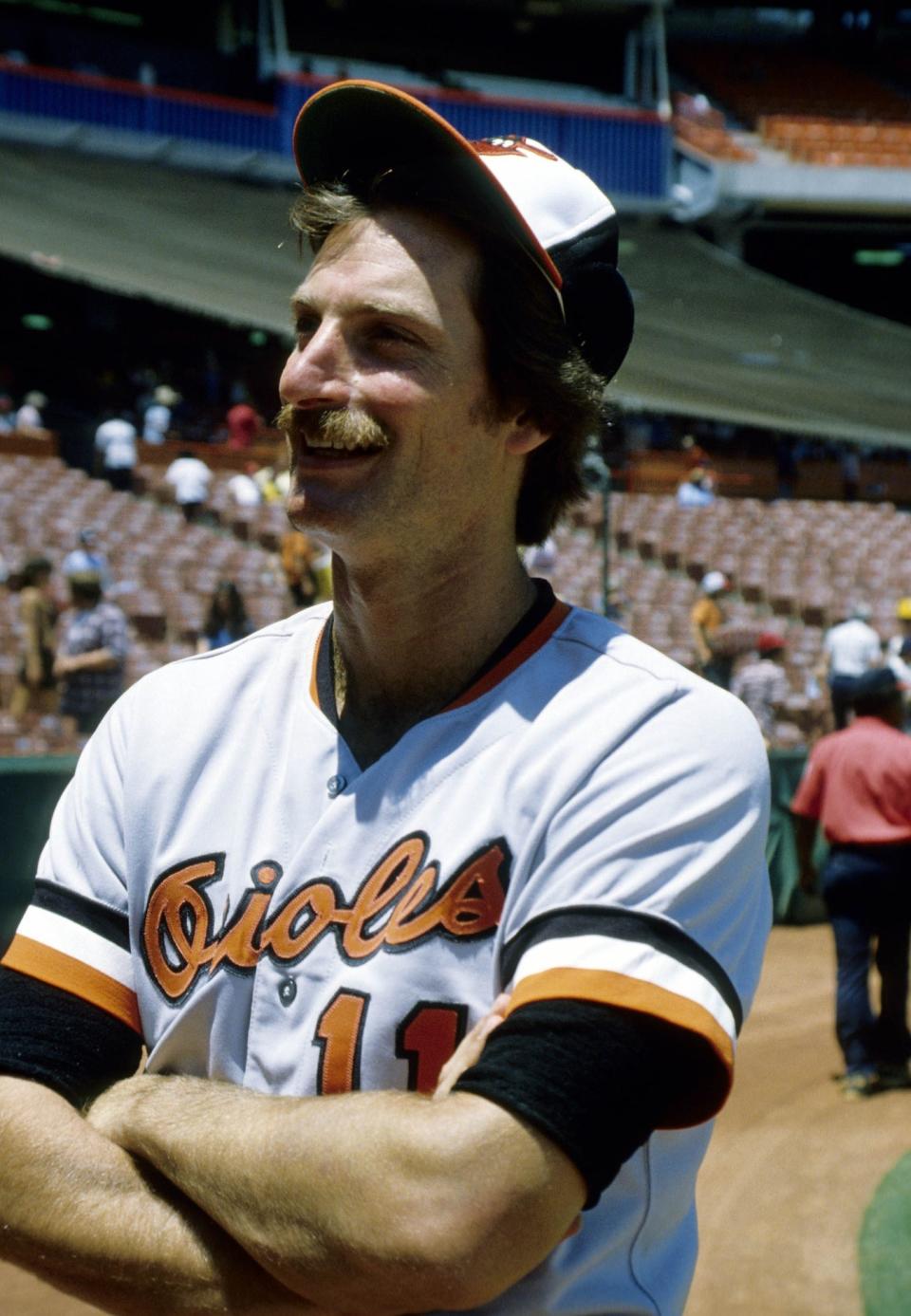
22. Doug DeCinces - 22.9
Doug DeCinces succeeded Brooks Robinson as the Orioles' third baseman, sharing the position in 1975 before becoming the primary starter in 1976. Across nine seasons (he made just 21 plate appearances in 1973 and 1974 combined), DeCinces batted .253 with 107 HRs and 397 RBIs. He was traded to the California Angels before the 1982 season, when he finished third in AL MVP balloting.
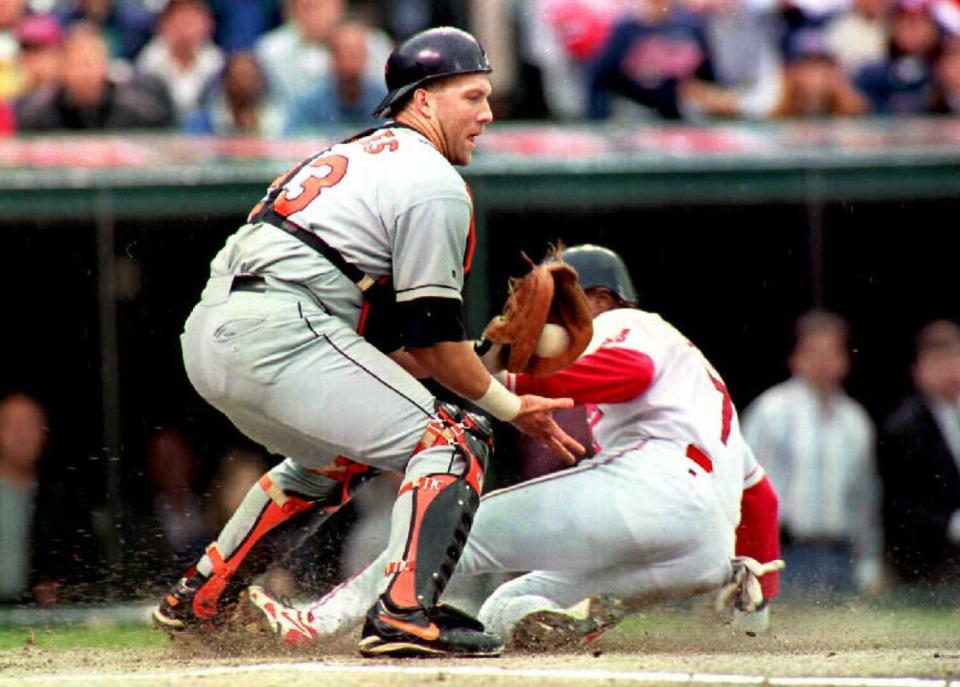
21. Chris Hoiles - 23.5
Chris Hoiles played his entire career (1989-1998) in Baltimore and was the Orioles' starting catcher for most of the 1990s. He had his best season in 1993 when he batted .310 with 29 HRs and 82 RBIs and finished 16th in AL MVP voting. He ended his 10-year career with a .262 batting average, 151 HRs and 449 RBIs.
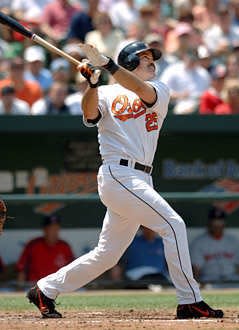
20. Rafael Palmeiro - 24.4
Rafael Palmeiro was one of the cornerstones of the Orioles' resurgence in the mid-1990s. From 1994 to 1998, Palmeiro batted .292 with 162 doubles, 182 HRs and 553 RBIs, finished in the top 15 in MVP voting three times and won a Gold Glove at first base. He returned to Baltimore for his final two seasons and collected his 3,000th hit as an Oriole in July 2005, but was suspended after a positive test for steroids days later. He played just seven more games after his suspension ended.
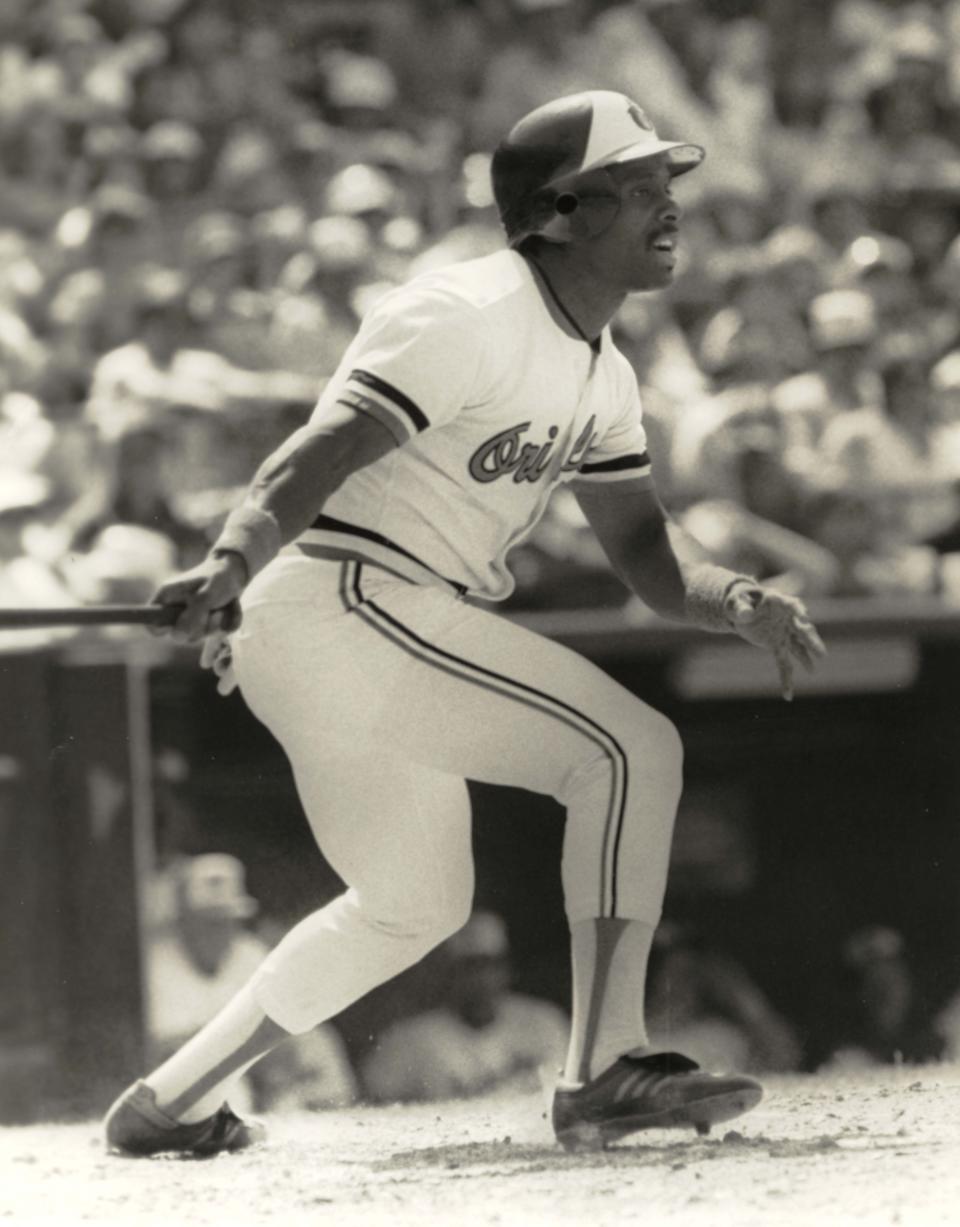
19. Al Bumbry - 24.7
It was almost guaranteed: If Al Bumbry was in the starting lineup, he'd be hitting in the leadoff spot. From 1973 to 1984, no Oriole hit first more than Bumbry. After a cup of coffee with the club in 1972, Bumbry was the AL Rookie of the Year in 1973 by batting .337, stealing 23 bases and leading the AL in triples with 11. He was an all-star in 1980 and finished his 13 years in Baltimore with a .281 average and 402 RBIs.
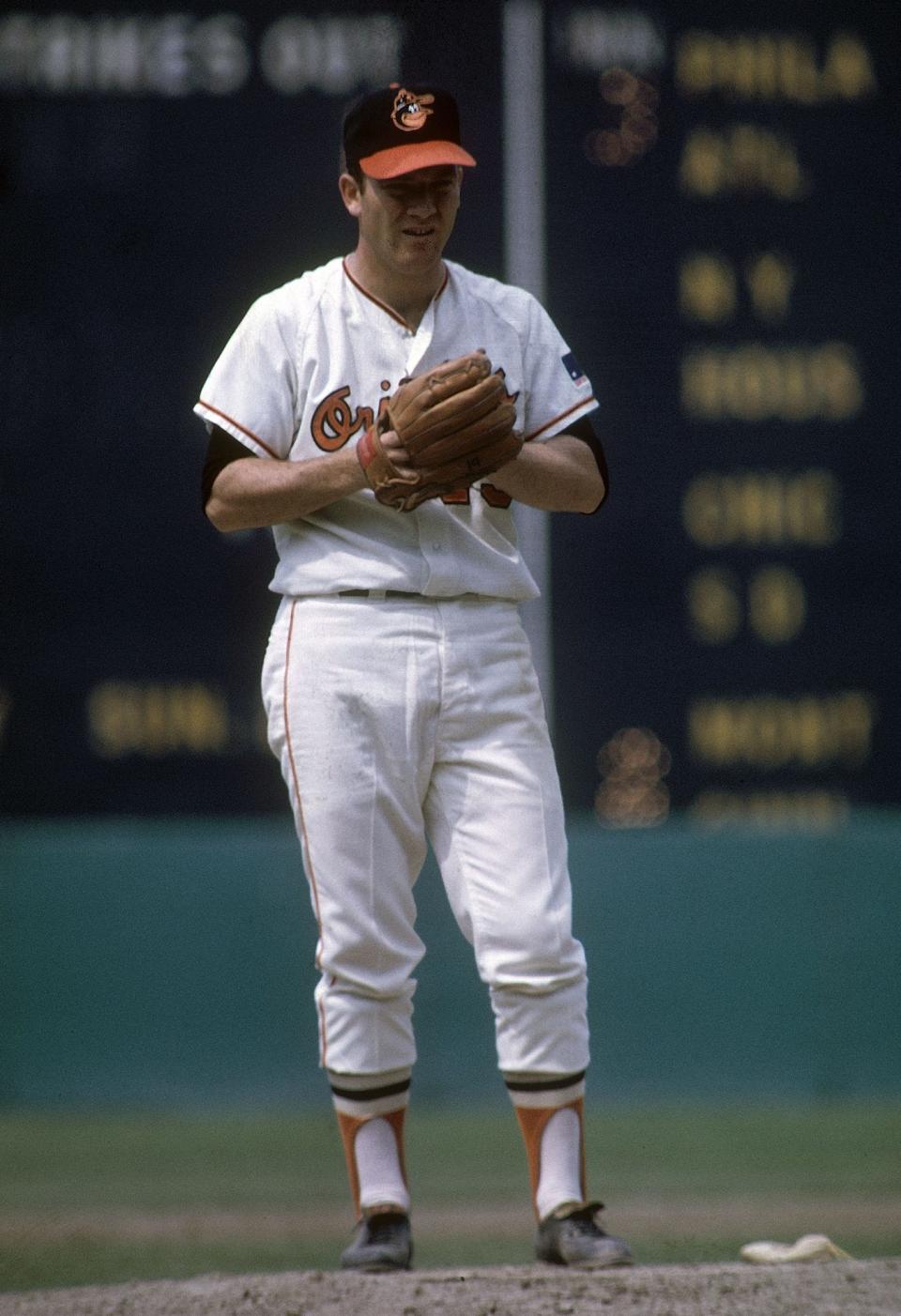
18. Dave McNally - 25.3
Lefty Dave McNally earned 181 of his 184 major league wins as a Baltimore Oriole. He was one of the best pitchers in the majors from 1968 to 1971, going 87-31 with a 2.81 ERA, finishing in the top four of AL Cy Young Award voting in three of those years (1969 to 1971) and finishing fifth in AL MVP voting in 1968 — the year Denny McLain won 31 games and was a unanimous choice for Cy Young. McNally was 181-113 with a 3.18 ERA over 13 seasons in Baltimore.
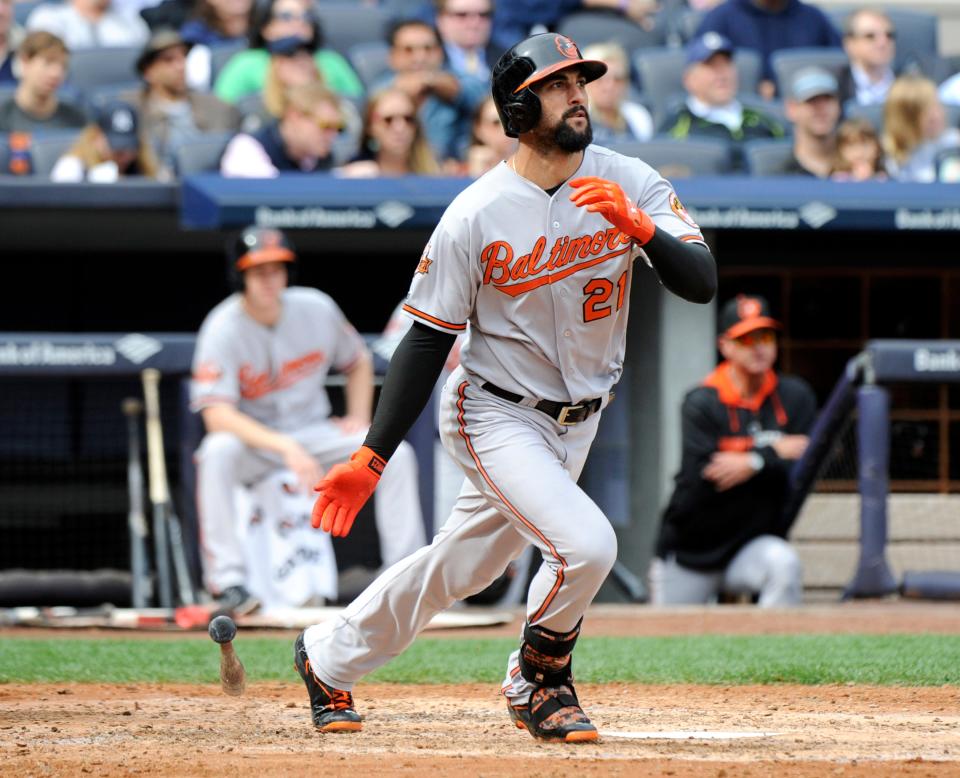
17. Nick Markakis - 26.0
Nick Markakis was often one of few bright spots on some dismal Orioles teams in the late 2000s and early 2010s. Markakis was always a solid producer in the top half of the Orioles lineup, batting .290 with 316 doubles, 141 HRs and 658 RBIs in nine seasons with the Orioles. He also won Gold Gloves in 2011 and 2014, his last season before signing as a free agent with the Atlanta Braves.
16. Brian Roberts - 28.8
Like Al Bumbry before him, Brian Roberts was a mainstay at the top of the Orioles' batting order. Once he became the team's full-time second baseman midway through the 2003 season, he rarely batted anywhere but the top of the lineup. For six years from 2004 to 2009, Roberts was one of the best at his position, batting .290 with 278 doubles, 69 HRs, 374 RBIs and 212 stolen bases. He led the AL in steals (50) in 2007, led the AL in doubles (50) in 2004 and led the majors in doubles in 2009 (56) before injury after injury knocked him off track.

15. Melvin Mora - 29.1
Orioles fans weren't sure what to expect when the team acquired Melvin Mora in the trade deadline deal that sent Mike Bordick to the New York Mets in 2000. After a few seasons as a utility player, Mora settled in as the team's regular third baseman in 2004 and had his most productive year as a pro. He batted .340 that season — second-best in the AL to Ichiro Suzuki's .372 — with 27 HRs and 104 RBIs. Mora was a two-time all-star in his 10 years in Baltimore and hit .280 with 158 HRs and 662 RBIs.
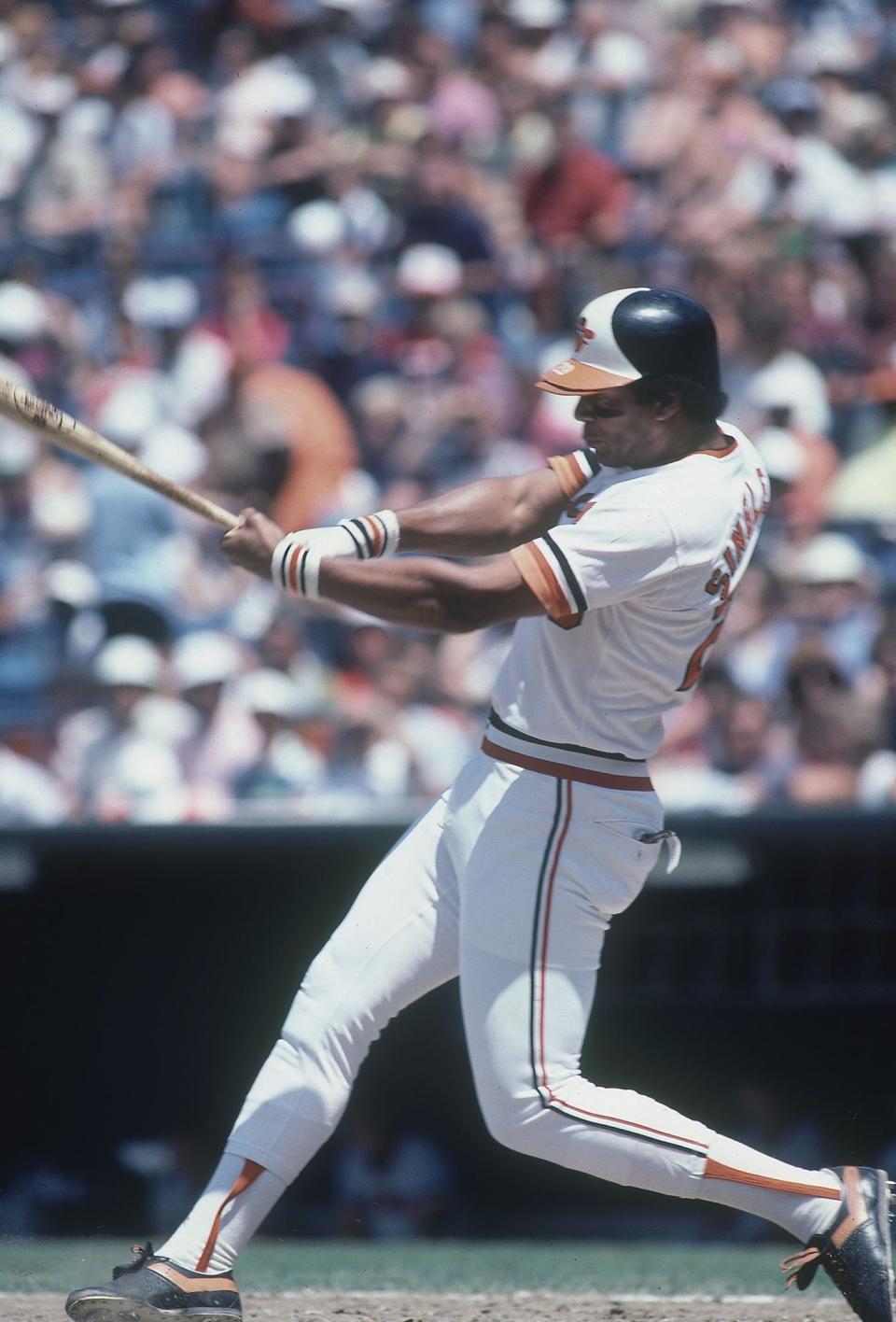
14. Ken Singleton - 30.0
Dave McNally pitched the 1975 season — his final season in the majors — with the Montreal Expos, going there in a trade that sent outfielder Ken Singleton to Baltimore. Once Singleton arrived, he was a mainstay in right field for a decade. He was in the top 10 in AL MVP voting three times — finishing third behind Rod Carew and Al Cowens in 1977, and as runner-up to Don Baylor in 1979. A three-time all-star, Singleton hit .284 with 182 HRs and 776 RBIs for the Orioles.
13. Manny Machado - 31.9
There were high hopes when the Orioles selected Manny Machado with the third overall draft pick in 2010 — the year the Washington Nationals selected Bryce Harper first overall. Drafted as a shortstop, Machado was relegated to third base due to the presence of Gold-Glover J.J. Hardy. But Machado shined at the hot corner, winning two Gold Gloves himself. He was a four-time all-star and finished in the top 10 in MVP voting three times with the Orioles. Over the equivalent of six full seasons, Machado batted .283 with 162 HRs and 471 RBIs.
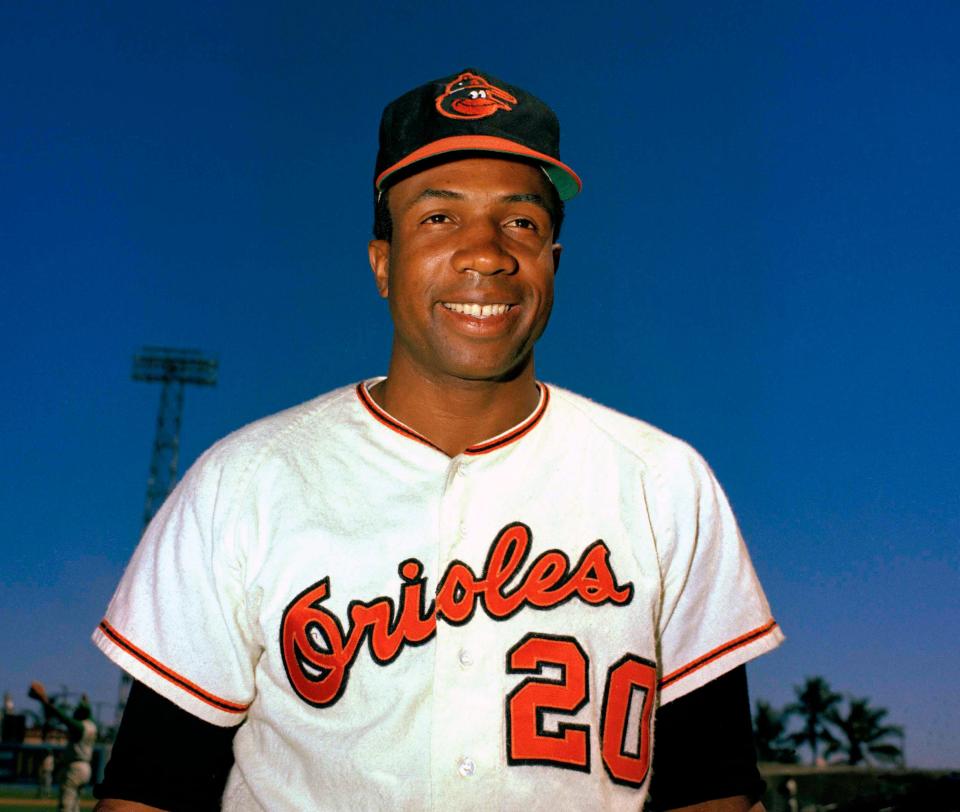
12. Frank Robinson - 32.4
No player had a first season with the Baltimore Orioles — or perhaps any team — like Frank Robinson in 1966. Dealt by the Cincinnati Reds in the offseason for three players, including Milt Pappas, Robinson hit for the Triple Crown with a .316 average, 49 HRs and 122 RBIs. He led the Orioles to a four-game sweep of the Los Angeles Dodgers in the World Series and was named series MVP. Robinson also became the first and only player to win the MVP award in both the American and National League. Robinson's stats in just six years with the Orioles are astounding: A .300 batting average, 179 HRs and 545 RBIs. He was an all-star in five of those six seasons and had three other top-10 finishes in MVP voting.
11. Adam Jones - 32.5
Adam Jones was the centerpiece of the five-player package the Orioles received from the Seattle Mariners in a trade for pitcher Erik Bedard before the 2008 season. And for most of his 11 seasons in Baltimore, Jones was the focal point on the field. He was an all-star and Gold Glove winner in 2009, but hit his stride in 2010.
From 2010 to 2017, Jones averaged 28 doubles, 28 HRs and 84 RBIs per season and never hit lower than .265. He was sixth in AL MVP voting in 2012 when he hit .287 with 32 HRs and 82 RBIs, then followed that up with a .285/33/108 season in 2013. He finished with five All-Star Game appearances and four Gold Gloves.
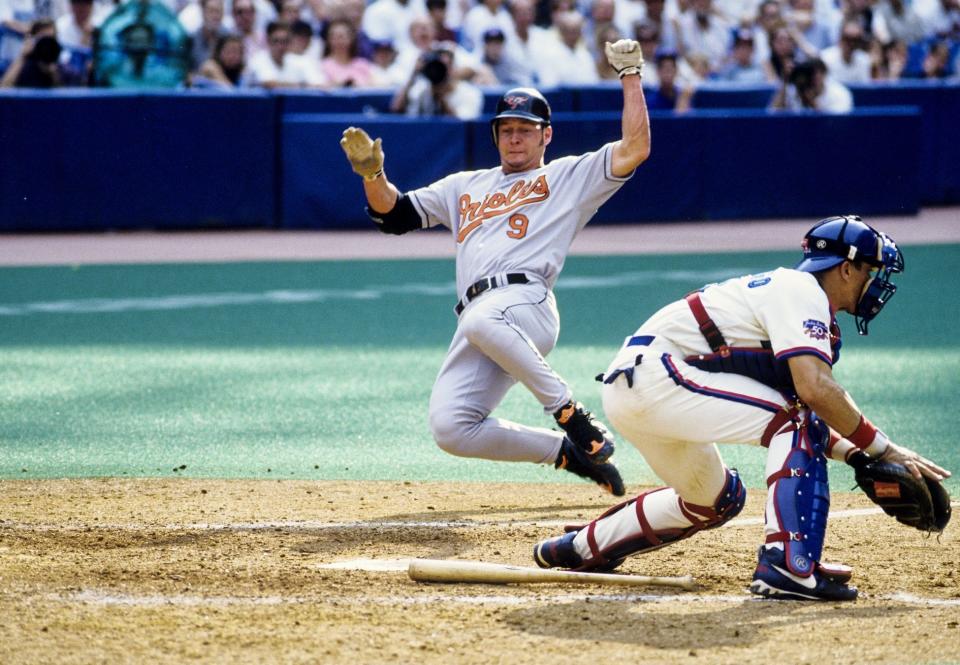
10. Brady Anderson - 34.9
Brady Anderson came to the Orioles (with Curt Schilling) in a 1988 trade deadline deal that sent Mike Boddicker to the Boston Red Sox. He struggled at the plate as a part-time player in his first 3 1/2 years in Baltimore, but his production increased dramatically when he became a full-time starter in 1992. He led the majors in plate appearances (749) that season, batted .271 with 21 HRs and 80 RBIs, stole 53 bases, walked 98 times and scored 100 runs.
Anderson peaked in 1996, hitting .297 and becoming the first Oriole to hit 50 home runs in a season. He also scored 117 runs and drove in 110. Across 14 seasons in Baltimore, Anderson hit .257 with 209 HRs, 744 RBIs, 1,044 runs scored and 307 stolen bases.
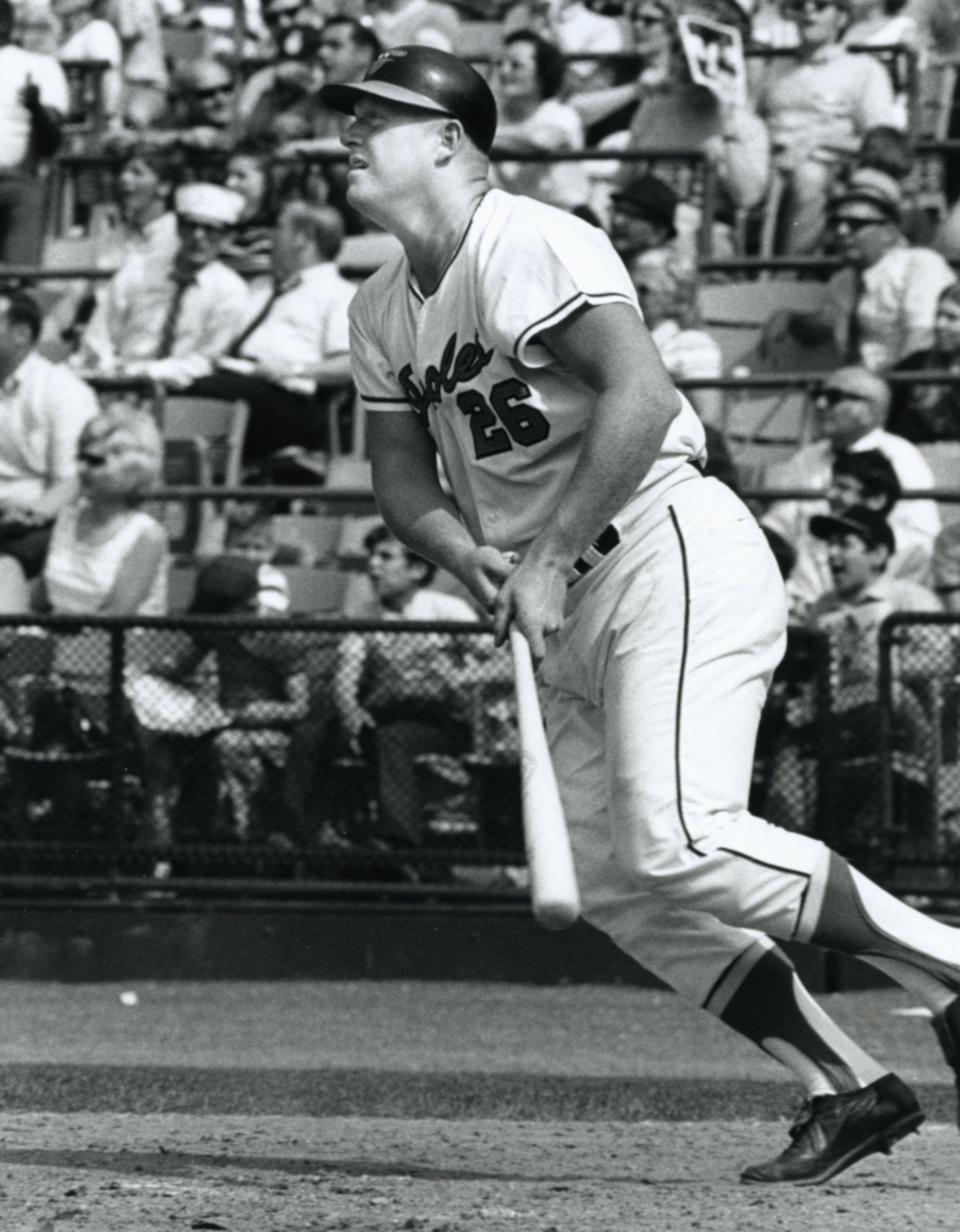
9. Boog Powell - 35.5
How many young fans who enjoy Boog's BBQ during a trip to Camden Yards realize Boog Powell was one of the Orioles' earliest star players? Powell played 14 seasons (1961-1974) in Baltimore and made four straight All-Star teams from 1968 to 1971. He finished third in AL MVP voting in 1966 (behind teammates Frank Robinson and Brooks Robinson) when he hit .287 with 34 HRs and 109 RBIs. He was second to Minnesota's Harmon Killebrew in 1969 when he hit .304 with 37 HRs and 121 RBIs. And he finally won the AL MVP award in 1970 when he batted .297 with 35 HRs and 114 RBIs. Powell batted .266 with 303 HRs and 1,063 RBIs in Baltimore before finishing his career in Cleveland.
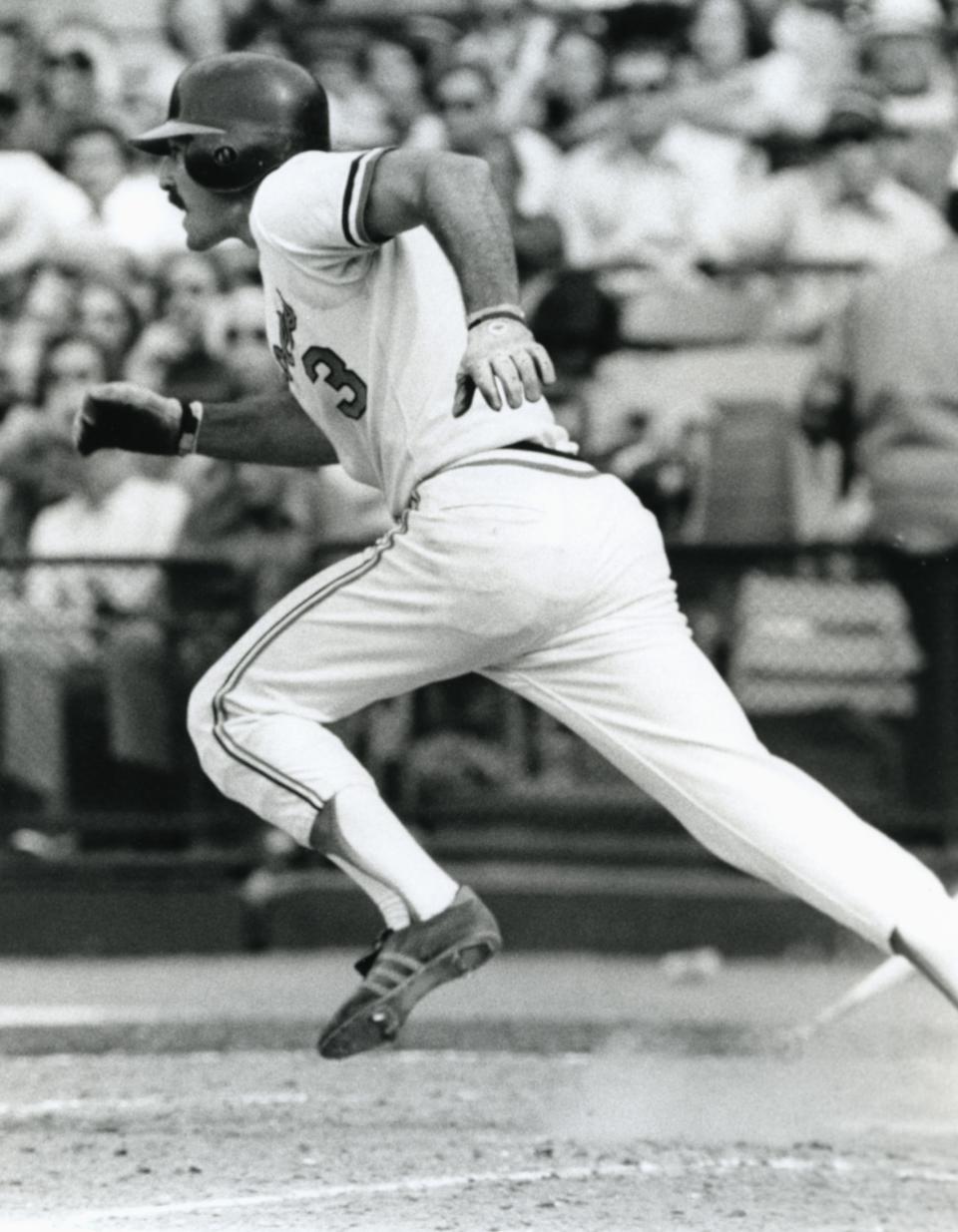
8. Bobby Grich - 36.0
Bobby Grich's seven seasons in Baltimore are often overshadowed — if not completely forgotten — due to his 10 years with the California Angels. But Grich established himself as one of the game's best second basemen during his five seasons (1972 to 1976) as the Orioles' starter. He was an all-star three times, a Gold Glove winner four times and received consideration in AL MVP voting three times, finishing as high as ninth in 1974. As an Oriole, Grich batted .262 with 70 HRs, 307 RBIs and 432 runs scored.

7. Paul Blair - 39.7
Paul Blair patrolled center field for 12 seasons in Baltimore and was one of the very best outfielders in the majors during his prime. Blair won his first Gold Glove award in 1967 and seven straight from 1969 to 1975. He was a two-time all-star and finished 11th in AL MVP voting in 1970 when he batted .285 with 26 HRs, 76 RBIs, 102 runs scored and 20 stolen bases. Blair hit .254 as an Oriole, with 126 HRs and 567 RBIs.
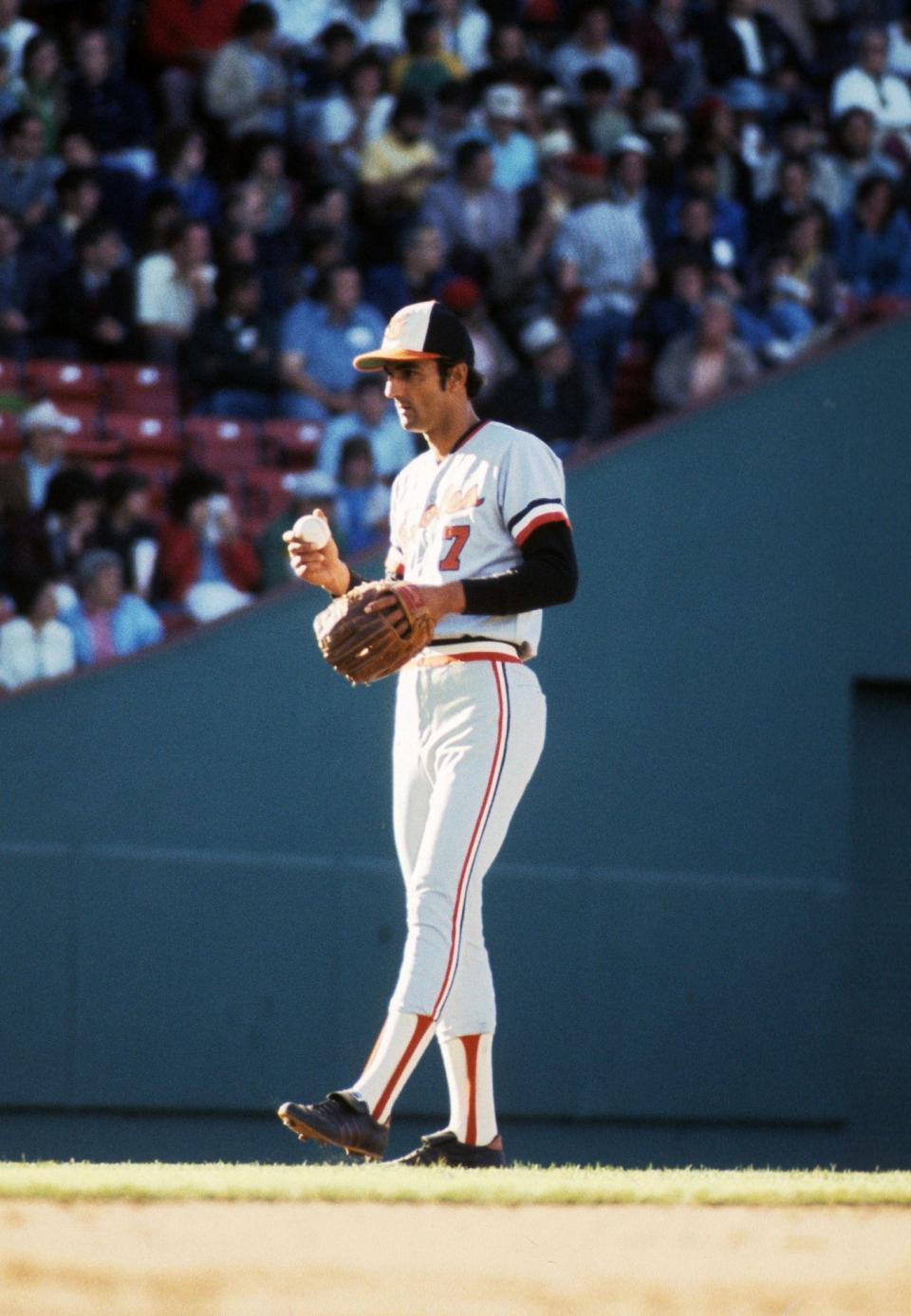
6. Mark Belanger - 40.9
Once upon a time in baseball, a shortstop was relied upon primarily for his defensive abilities and any offensive production was merely a bonus. Mark Belanger was a shining example of that idea. Over 17 seasons (1965-1981) in Baltimore — 13 as the full-time starter — Belanger batted .227, collected 1,304 hits and just 20 HRs. But it was Belanger's defense that kept him in the lineup.
He won eight Gold Glove awards in his career, including six straight from 1973 to 1978. According to Baseball Reference, Belanger has the second-highest Defensive WAR of all time (39.5), behind only Ozzie Smith. Belanger played one season with the Los Angeles Dodgers in 1982 as the Orioles had to make room at shortstop for Cal Ripken Jr.
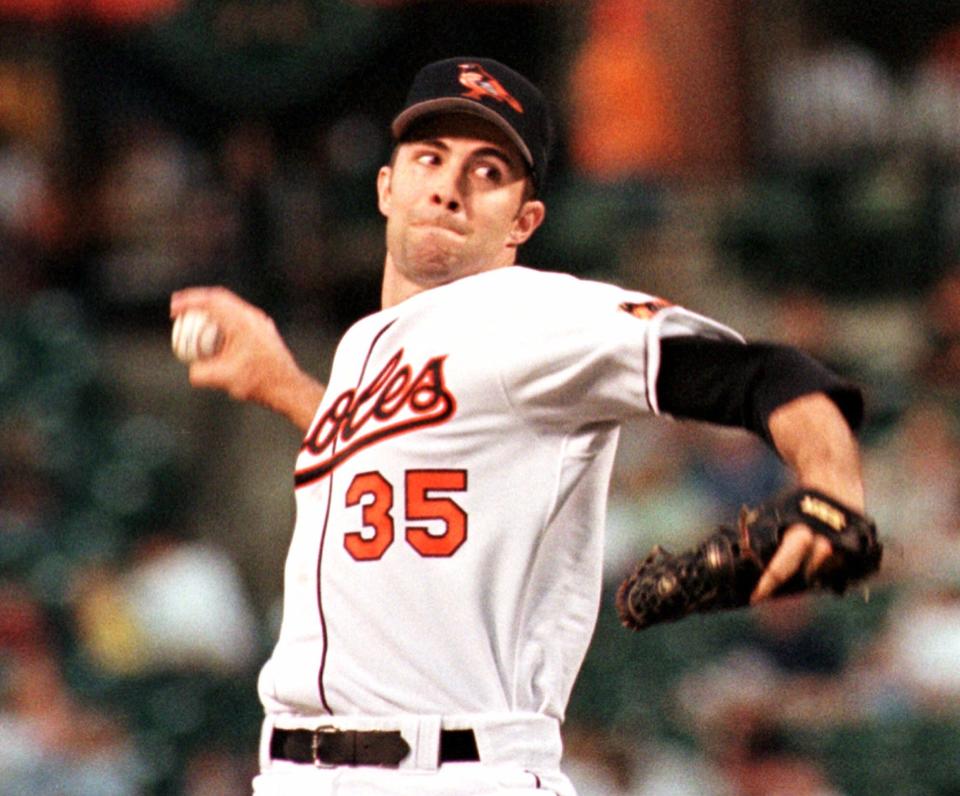
5. Mike Mussina - 47.7
Mike Mussina was one of baseball's most reliable starting pitchers throughout his 10 seasons in Baltimore. He racked up a 147-81 record with a 3.53 ERA from 1991 to 2000 and had just two losing seasons in that span — the first and the last, the two worst Orioles teams he pitched for.
In between, he finished in the top 6 in AL Cy Young voting seven times but never won the award (he was second to Pedro Martinez in 1999 for his best finish). Mussina twice won 18 games and twice won 19 games with the Orioles, was a five-time all-star and won four straight Gold Gloves from 1996 to 1999.
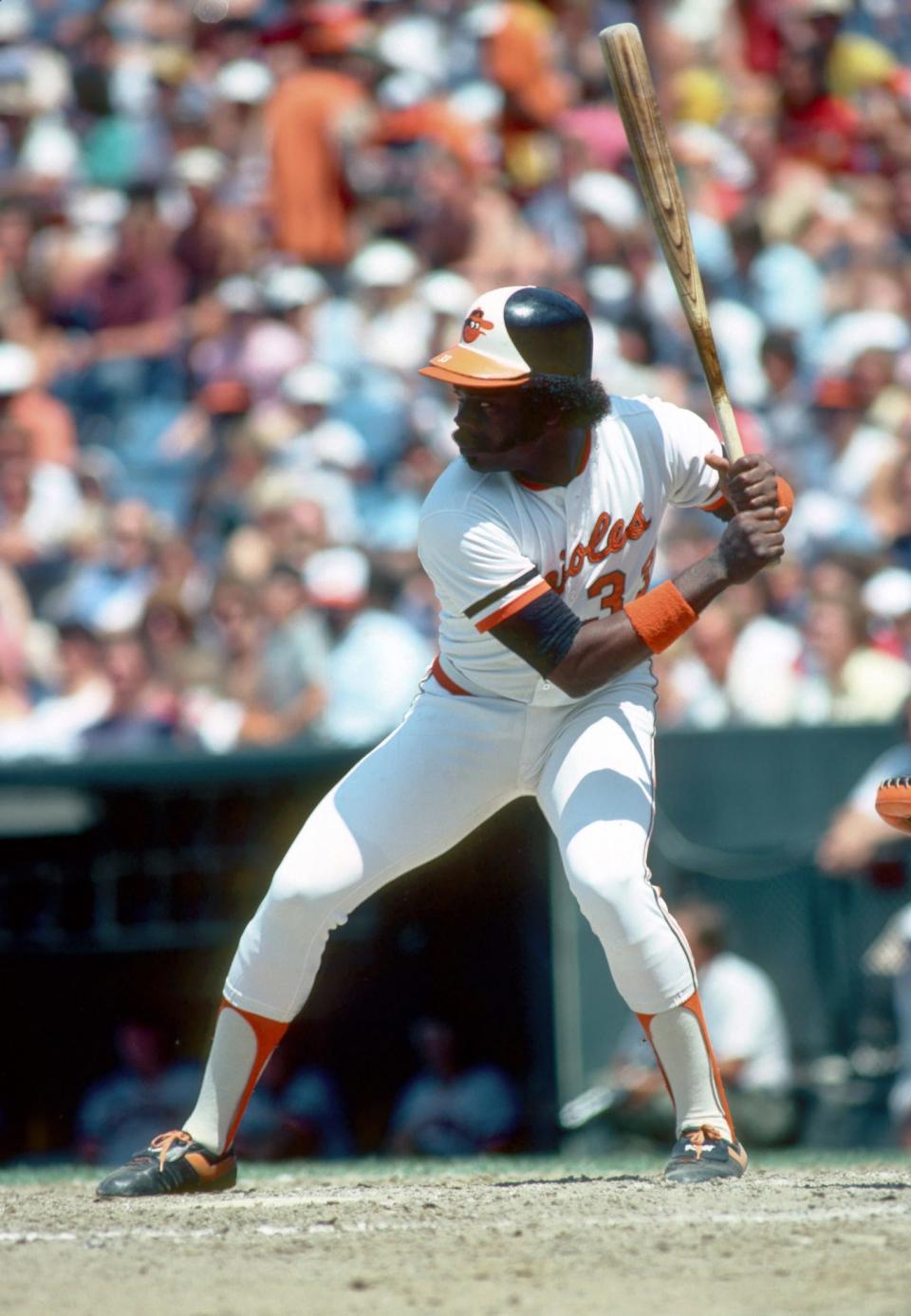
4. Eddie Murray - 56.5
Eddie Murray was quite simply one of the most feared switch-hitters in baseball history, and arguably the best all-around player in the game in the early 1980s. He stormed onto the scene in 1977, winning AL Rookie of the Year by hitting .283 with 27 HRs and 88 RBIs.
From 1980 to 1985, Murray batted .304 and averaged 30 doubles, 30 HRs and 108 RBIs per season. He was in the top 6 in AL MVP voting each of those years, including back-to-back runner-up finishes to Robin Yount in 1982 and Cal Ripken Jr. in 1983. He also won three straight Gold Gloves from 1982 to 1984.
Across 13 seasons in Baltimore (1977-1988, plus a brief return in 1996), Murray batted .294 with 2,080 hits, 363 doubles, 343 HRs and 1,224 RBIs — and only once struck out more than 100 times (104 in his rookie season).
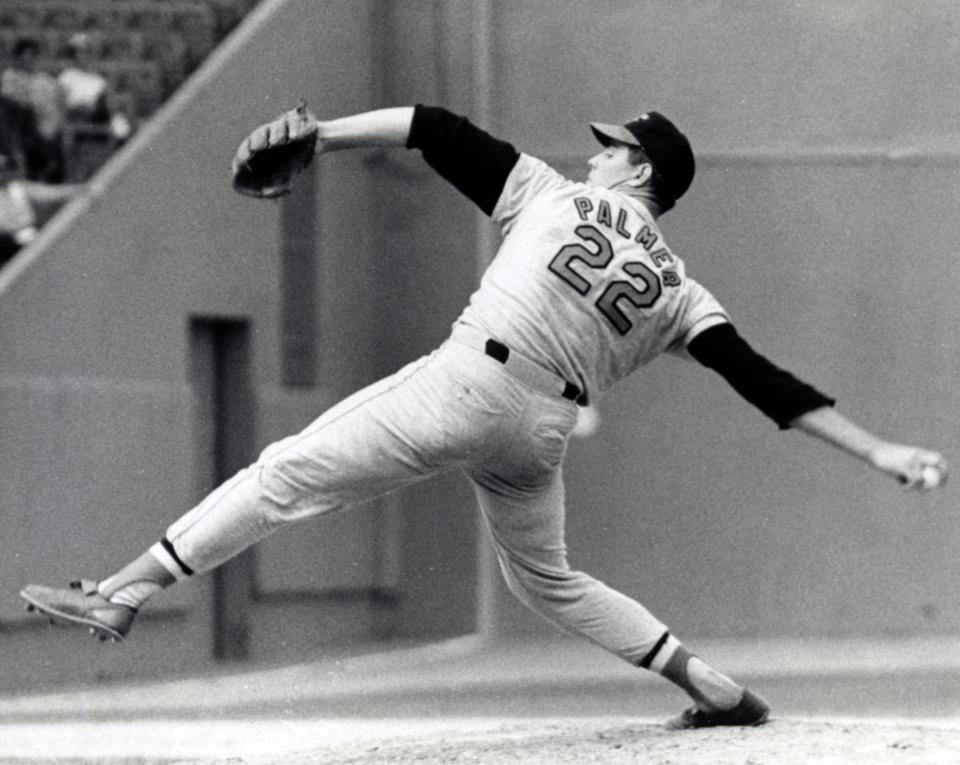
3. Jim Palmer - 67.6
After arm troubles led to him making just 10 appearances — all in the minors — in 1968, the Orioles left Jim Palmer unprotected in that year's expansion draft. Luckily for Baltimore, neither the Kansas City Royals nor the Seattle Pilots selected Palmer because he bounced back with a decade of dominance.
From 1969 to 1978, Palmer went 192-101 with a 2.52 ERA and averaged 277 innings per season. (Remove an injury-plagued 1974 season when he went 7-12 and those numbers look even better). He was in the top 5 in AL Cy Young voting seven times during that span, winning the award in 1973, 1975 and 1976 and finishing a close second to Sparky Lyle in 1977. Palmer also finished second in AL MVP voting to Reggie Jackson in 1973, added another Cy Young runner-up in 1982 and won four straight Gold Gloves from 1976 to 1979. In 19 years as an Oriole, Palmer went 268-152 with a 2.86 ERA.
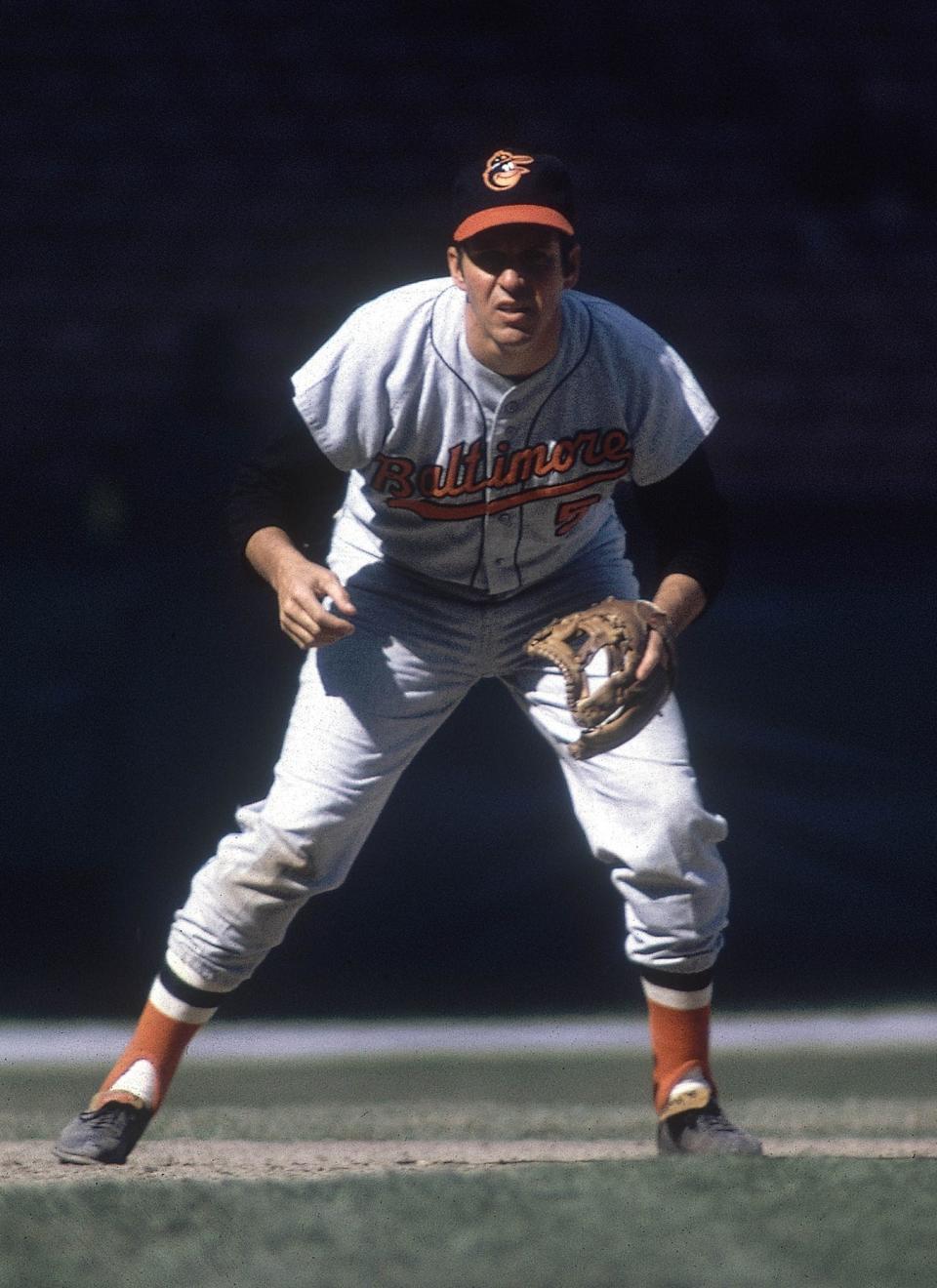
2. Brooks Robinson - 78.4
Orioles fans will argue that there is no better third baseman — at least defensively — in the history of the game than Brooks Robinson. The numbers back them up. Robinson ranks third all-time in Defensive WAR (39.1) behind Ozzie Smith and teammate Mark Belanger — both shortstops. Robinson won his first Gold Glove in 1960 and made the award his own. No other American League third baseman would win the award until 1976.
But Robinson could hit, too. He finished his 23-year career — all in Baltimore — with a .267 average, 2,848 hits, 482 doubles, 268 HRs and 1,357 RBIs. He was also an all-star for 15 straight years beginning in 1960 and finished in the top 10 in AL MVP voting seven times — winning the award in 1964 and finishing second to teammate Frank Robinson in 1966. He also batted .303 in 39 postseason games and was the MVP of the 1970 World Series.
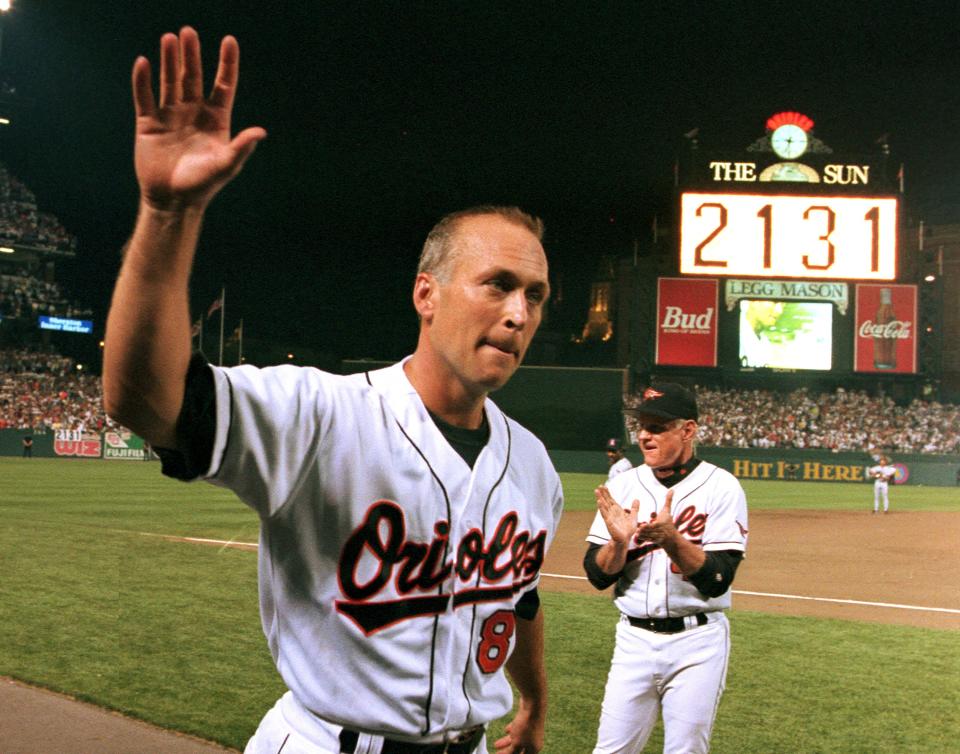
1. Cal Ripken Jr. - 95.9
Was there any question that Cal Ripken Jr. would top this list? He holds a record most fans believe will never be broken — if even approached — for playing in 2,632 consecutive games. He helped revolutionize the shortstop position from a defense-first spot in the lineup (like his immediate predecessor Mark Belanger) to one that provided more offensive punch in addition to defensive prowess.
When the Orioles made Ripken their starting shortstop to open the 1982 season, they saw little, if any, drop off from Belanger defensively and an enormous jump in production on offense. Ripken hit .264 as a rookie, with 28 HRs and 93 RBIs, and won AL Rookie of the Year — the first of many honors in Ripken's career.
He won his first of two AL MVP awards in 1983, hitting .318 with 27 HRs and 102 HRs while leading the majors with 211 hits and 47 doubles. He also made the first of 19 straight All-Star Game appearances and won the first of eight Silver Slugger awards as the top-hitting shortstop.
His second MVP came in 1991 — arguably his best season — when he hit .323 with 34 HRs and 114 RBIs, won his first of two Gold Gloves, and put on a show in the Home Run Derby and All-Star Game in Toronto.
Ripken spent his entire 21-year career with his hometown team (he grew up in Aberdeen, Md.), playing in 3,001 MLB games. He finished with a .276 batting average, 3,184 hits, 603 doubles, 431 HRs and 1,695 RBIs and never struck out more than 97 times in a season.
This article originally appeared on The Herald-Mail: Greatest Baltimore Orioles of all time: Our list of the top 50

